Assessment Practices and Highlights
2020-21 Assessment Practices & Highlights
The Office of Housing and Residence Life strives to cultivate a culture of evidence supporting our mission, vision, and values. In conjunction with UNC Greensboro’s strategic plan of “Taking Giant Steps” and the Division of Student Affairs strategic plan we strive to create and maintain healthy, vibrant residential communities conducive to student success.
The Covid-19 pandemic created numerous challenges as we continue to serve residential students and deliver on our promise of being a “leading residential program by providing students with comfortable and safe living environments that support academic success and promote social responsibility.”

While we were forced to severely curtail operations in March of 2020, the next five months provided our staff needed time to adjust policies and procedures, develop new ways of connecting with students, and utilize our expertise in technology to expand our capacity to meet the needs of residential students. The pandemic also provided the opportunity to reevaluate our program from the bottom up. Through carefully targeted assessments, we were able to better serve students even with a myriad of restrictions in place. We were also able to see where we could better use time, effort and resources to positively impact the lives of our students.
This website is not comprehensive of all our efforts rather it provides a brief snapshot of our yearly assessment practices and highlights. Information shared is data from 2020-2021 academic year.
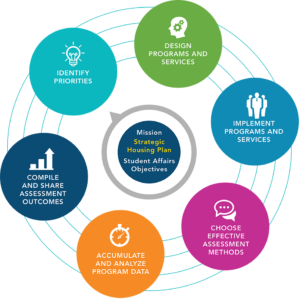
References & Resources
- UNCG Strategic Plan: Taking Giant Steps
- Division of Student Affairs Strategic Plan
- Division of Student Affairs Assessment Newsletters
| 2020-2021 Goals/Objectives | Measures/Target | Division Strategic Plan |
|---|---|---|
| Implement Comprehensive Covid Housing Operations and Facilities plan to ensure safe continuity of service in HRL Facilities. | Review assignments and create and implement new reduced density plan. Overhaul move-in process. Update and expand cleaning process of all common areas. Create and implement safety signage plan. Create and implement social distancing plan. | Health & Wellness |
| Develop an updated financial plan to ensure financial stability of department throughout Covid-19 crisis and beyond. | Revise and manage current budget with updated revenue projections, expenditure reductions and revised project schedule. Create new 10-year budget plan with projections to sustain HRL through the current financial crisis. | Organizational Sustainability & Infrastructure |
| Complete design and/or construction of Capital Projects. | Ragsdale/Mendenhall Renovations, Moore/Strong and Phillips/Hawkins Roof projects, Tower Village Bathroom vanities. | Organizational Sustainability & Infrastructure |
| Improve safety and efficiency through technology upgrades. | Complete installation of security camera coverage of all residence hall entrances and exits. | Organizational Sustainability & Infrastructure |
| Develop and Implement Comprehensive Residential Covid Response Plan to continue to support student success through Covid 19. | Revise Reslife Staff training at all levels. Revise and update Reslife policies including visitation, social distancing, mask wearing, etc. Implement virtual programming and engagement model. | Student Learning & Student Success |
| Develop and implement Quarantine/Isolation plan. | Create and maintain quarantine operations for up to 150 student spaces. | Health & Wellness |
The impact of the COVID-19 pandemic is not something that can be easily measured. The impact for UNCG residential students has been great. From changing class formats, to more restrictive visitations policies and less students on campus, living on campus in the 2020-2021 academic year posed several challenges. Coupled with the financial impact to students and their family members, social distancing requirements, and a general sense of concern that many within the US experienced, UNCG residential students were impacted greatly.
To better understand the student experience, UNCG Student Affairs Office of Assessment and Housing and Residence Life surveyed UNCG students in the Spring of 2021. Housing and Residence Life was specifically interested in knowing how residential students were impacted compared to students living off-campus. Some of the key findings were:
- Residential students were more likely to report higher levels of belonging, connection to the institution, and the ability to connect with peers.
- Residential students were more likely to report they completed at least 12 credit hours in Fall 2020.**
- Residential students were less likely to report unmet financial needs or financial impact related to the pandemic.**
- Residential students were less likely to report mental health impact related to pandemic (stress/anxiety, depression, loneliness).**
** Statistical Significance .000 level
Housing and Residence Life strives to create environments for residential students to thrive. A major component of this work is to help student develop personal connections within the residence hall and an overall connection to UNCG. Despite the impact of COVID-19, we were able to see these goals realized.
Key Findings Excerpt- Top 20 Responses: How Students Used Cares Act Funds

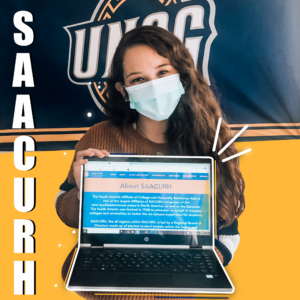
SOUTH ATLANTIC AFFILIATE OF COLLEGE AND UNIVERSITY RESIDENCE HALLS (SAACURH) REGIONAL LEADERSHIP CONFERENCE (RLC)
In November 2020, UNC Greensboro had the pleasure of hosting the South Atlantic Affiliate of College and University Residence Halls (SAACURH) Regional Leadership Conference (RLC). This is an annual leadership conference for students who are involved in residential student leadership programs such as Hall Council, NRHH, and RHA. Student Leaders from 10 states across the region come together each year to share what they have learned with each other, build community, and advocate to continue to better the residential student experience across the region. UNCG had the opportunity to host the first ever Virtual RLC for the region. We received numerous educational sessions and proposals and were ultimately able to offer 20 options for our attendees to choose over the course of the conference. Over 400 people from 41 institutions registered and joined us virtually for this experience.
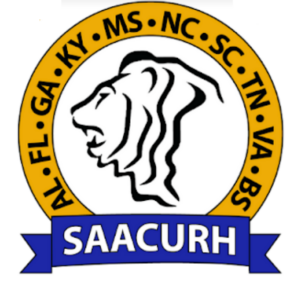
RESIDENCE HALL ASSOCIATION
During the second semester in Spring 2021, RHA decided to focus its efforts on Soles 4 Souls where gently or new shoes would be turned into opportunities. Our Hall Council members were able to collect over 50 pairs of shoes in a month-long period. We were informed that in countries like Haiti, 50 pairs of shoes can provide food, shelter, and education for a family for up to a month (30 days).
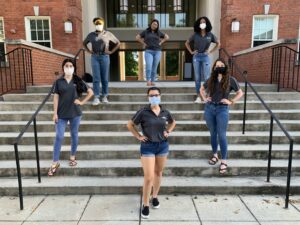
NATIONAL RESIDENCE HALL HONORARY (NRHHH)
This past Spring 2021 semester, the NRHH executive board members thought it would be a great idea to hold a food drive and paint rocks to beautify UNCG’s campus garden!
The food drive event, also known as “For the Love of Giving”, was held in February 2021, to provide NRHH members and other UNCG students with the opportunity to donate boxed and canned goods. This was such a heart-felt and generous way for students to give to those in need! The turnout was successful as we were able to donate a wagon full of donations! The Spartan Open Pantry was elated and grateful for our willingness to give back to our community.
As it pertains to the rock-painting event that was held in March 2021, NRHH decided to allow both NRHH and RHA members to paint rocks for the UNCG garden located on McIver Street. The co-advisor of the UNCG garden was in need of embellishments for the garden, so we were delightfully willing to contribute!
It was a fun time of fellowship amongst both organizations, getting to know one other, and a way to test our creativity! NRHH and RHA members painted such beautiful masterpieces that added exuberance to the garden! Both service events were executed safely and efficiently, as we met both goals of serving our community.
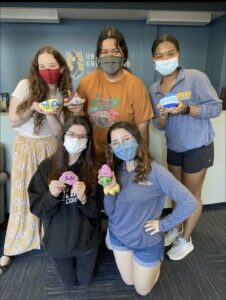
SPEED FRIENDING
With Covid-19 creating a challenge for many students to connect during the 2020-2021 academic year, many students without roommates or new students to UNCG struggled to make connections and meet others. Without the plethora of student programs that usually encourage social bonding, some students really struggled to connect with others. Speed Friending was designed to help fill this gap, and specifically target students without as many opportunities to bond with other students. The program’s goals were:
- Using targeted and specific marketing, reach out to student populations that have been identified as potentially having barriers to creating social connections with other students.
- Provide a safe environment for students to network and get to know each other, opening the door for future social engagement as well as developing a sense of belonging within their communities.
- Provide opportunities for all students in the community to get out of their room and engage with their peers.
| Total Students Engaged | Total Programs Held | Avg. # of students per program | Total Connections Made | Surveys Completed |
| 75 | 8 | 9.5 | ~360 | 30 |
EVENTS AND PROGRAMMING
Programming and in-person interactions of groups of residents had to look different during the 2020-2021 academic year. Due to social distancing guidelines and state requirements for limited in-person gatherings, residence life staff were required to find new ways to interact with residents and encourage them to interact with each other. Despite these limitations, close to 900 programs were offered to the on-campus residents.
Many programs met multiple objectives as outlined by the chart below:
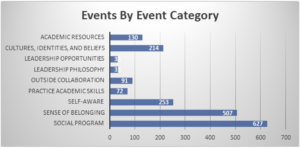
2020-21 Resident Advisor Training
Resident Advisors play a crucial role in Housing and Residence Life and ultimately in the success of residential students. As such, HRL devotes a considerable amount of time, energy, and resources to their training and development. During a nearly two-week period in the fall, Resident Advisors are trained in conflict mediation, policy enforcement, individual interactions, and acclimated to new policies and procedures. This was particularly important for the Fall 2020 semester, as there were many changes due to the Covid-19 pandemic.
A goal of training is always to have staff feel confident as they begin the year. This year, 81% of Resident Advisors felt confident of their abilities to be successful as an RA before training. This number rose to 98% at the conclusion of fall training.
COORDINATOR FOR RESIDENCE LIFE TRAINING
Coordinators for Residence Life (CRLs) are expected to wear many hats. They serve residents in numerous ways, work to identify and address facility issues, and administer the UNCG Conduct Process. Though residence life staff will hear 55% of the total conduct issues on campus, as there are many CRL staff they may not hear cases on a consistent basis. This can sometimes lead to confusion on the conduct process, as the knowledge required to successfully administer it is quite extensive.
In the Fall of 2020, Residence Life administered a Needs Assessment to all staff working with conduct to better understand where additional training or resources may be necessary.
Need:
One of the key takeaways from this assessment was the need for a comprehensive sanctioning guide to provide guidance for staff when deciding the educational sanctions for a student found responsible of violating the Student Code of Conduct.
Outcome:
A 21-page sanctioning guide was created in the Spring of 2021 to provide staff with ample resources and recommendations when assigning sanctions.
CONNECTIONS
Purpose of Connections
The University of North Carolina Greensboro is a learning institution that strives to provide students with a unique, diverse experience. The Department of Housing and Residence Life as an entity of the institution contributes to this goal by providing a living environment that is unmatched. In order to accomplish this goal, Resident Advisors (RAs) implement intentional interactions with their residents called Connections. Connections serve as a checkpoint for RAs to ensure residents are doing well, provide helpful resources, and mentorship.
Connections Questions
Each connection period had a set of specific questions that Resident Advisors asked their residents. These questions prompted students to think about their goals, academics, and well-being so proper support and resources were provided to ensure success in their matriculation. The questions for each period were:
Period 1: January 29th-March 1st
- How are you doing?
- What are your goals for this semester?
Period 2: March 1st-April 12th
- Thinking about your academics, how are you doing this semester?
- What resources have been helpful to you this year/semester?
Highlight of Results
Even with this year being challenging with COVID-19, students were still focused on their academics, wanting to socialize and make friends, as well as accomplish the goals they set for themselves.
- 3,539 or 62.89% of students rated “Pretty Well” when asked how they were doing
- 3,872 or 69% of students had safe, social-distanced, in-person conversations with their RA.
- 3,344 referrals were made to campus resources such as the Academic Success Center, Student Support Services, and faculty office hours,
- 5,628 Connections were made during the Spring 2021 semester.
Students also shared their experiences this semester. This is what some of them had to say (responses were edited to protect identity of students):
- “Doing good overall and have only been a little stressed when it comes to class courses. New to UNCG and Cone Residence Hall this semester and really loves it and her roommate.”
- “Doing very well this semester and that after switching her major she is very happy. It was the best decision.”
- “The semester has been moving along nicely for her and she’s looking forward to graduation.”
Overall, residential students at UNCG felt good being in the halls and at the institution as well as sought out and were provided resources. The full report is below.
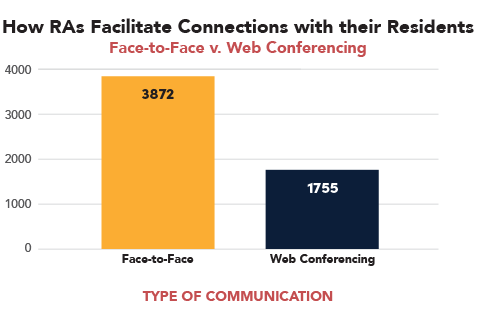
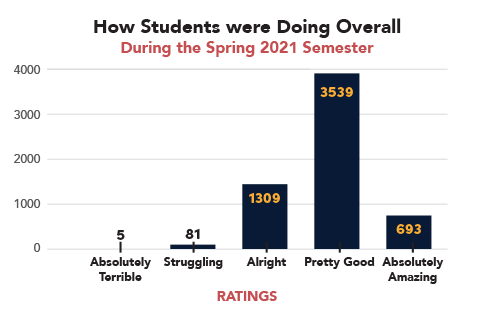
Social distancing requirements, online classes, and very limited in-person events around campus made getting to know residents more difficult for live-in staff members. As outlined in other sections, residence life sought creative ways to continue to connect with residential students. The following report outlines residential students’ experience and perspectives of their interactions with resident advisor and live-in professional staff during the 2020-2021 academic year.
Residence Life staff sought to determine if the Covid-19 pandemic was having an effect on how often residents were coming and going from the residence halls. We evaluated access data to see if there were any noticeable changes in access patterns.
A full report is linked below, but a few keys takeaways were:
- During the first two weeks of the semester, individual resident access swipes over a comparable two-week period were virtually unchanged (2019 – 40.39. 2020 – 40.09). This was slightly unexpected. With the reduction of in-person classes, athletic events, and limitations of all in-person gatherings, one would have expected for this to impact how often residents are leaving the halls.
- Anecdotal evidence suggested that access patterns changed as the semester progressed. A second comparison was made between the 10th and 11th weeks of school in the Fall of 2019 and Fall 2020. This comparison showed a considerable difference in how often residents were accessing the hall later in the semester compared to a similar time period in 2019 (43.93 in 2019 v. 36.85 in 2020).
The 2020-2021 academic year saw many changes due to the Covid-19 pandemic. Among these changes, there were substantial changes to Housing and Residence Life policies for residents living on-campus. Overnight visitation was not allowed, nor was visitation from anyone who did not live on campus. These changes were made for the safety of residents and in hopes to do our part in slowing the spread of Covid-19.
In order to make sure residents were aware of these policy changes, HRL took great effort to educate students through signage in the halls, direct emails, floor meetings, and updated information on the HRL website. To make sure residents were aware of the changes, HRL distributed a survey to all on-campus residents. The survey was another effort to better inform residents, as any incorrect answers triggered a response in the survey to give residents the correct information.
A few brief highlights are included here:
- When asked how many guests a UNCG resident can bring into their own residence hall, 93.64% of responses reflected either an accurate awareness of the guest policy (82.43% correctly answered with “one” guest) or a more restrictive perception of the updated guest policy (11.21% selected “None”).
- When asked if residents were allowed to have overnight guests, 86.74% correctly selected “No.” Any incorrect responses of “Yes,” or “Yes, but only in Suite-and Apartment-style housing” were immediately prompted with the correct response as well as where to find more information on that policy change.
ROUND REPORT
Three times nightly (four times on the weekends), Resident Advisors are required to complete rounds of the community in which they are assigned. These rounds allow RAs to interact with residents, check on the physical condition of the hall, and address any policy violations, if needed. Reports of each round are filed electronically so that they can be reviewed by the hall supervisor and quantitative data (noise levels, number of interactions, etc.) can be tracked. During the 2019-2020 academic year, HRL noticed that many of these reports were not filed, or not filed in a timely fashion. Improvement in this area was a priority for residence life staff.
Here are a few brief highlights are included here:
- Total round report completions rose from 76.5% in 2019-2020, to 88.6% in 2020-2021, with completion percentage in traditional halls rising from 74.8% in 2019-2020 to 89% in 2020-2021.
- The length of the average round dropped from 37 minutes and three seconds on average in 2019-2020 to 32 minutes and 25 seconds in 2020-2021. This was somewhat expected with less residents in the hall, and also more residents staying in their rooms.
Despite the additional cleaning and sanitizing demands required due to the Covid-19 pandemic, Housing and Residence Life maintenance and housekeeping staff members continued to provide residents with exceptional service.
A few key highlights include:
- 57% of residents completed a work order request during the year.
- Of the 43% who did not, over 76% reported they knew how to make a request if needed.
- 93% of residents rated the cleanliness of the common areas as an A or B, with 68% providing an A rating.
- 90% of residents reported their work order request being completed quickly, with 88% being happy with the initial response.
ROOM CONDITION REPORTS (RCRS)
Residents are asked to submit any pre-existing damage to their room upon arrival to UNCG through the RCR form. Though only a small percentage of students report any issues at the time of move in, our facilities staff work quickly to address any matters that require immediate attention. HRL works to ensure all residents know how to report any issues, but we are also happy to see the overall number of RCRs decline, as this means we’ve addressed any potential issues before residents arrive.
A few key highlights include:
- Between July 2020 and May 2021, there were a total of 626 individual RCRs completed in Roompact. When comparing 2019-2020 and 2020-2021 Completed RCRs by Hall (adjusted for population changes), there was a 5% decrease in the average completion rate for Traditional and 9% for Suites and Apartments.
- Paint chips continue to be the primary issue reported (35% of total issues reported).
Satisfaction with the process of applying for housing and the room a student is assigned are key drivers of student overall satisfaction. A part of this satisfaction is the feeling a resident has on the value provided by living on campus, and how living on campus impacted their overall experience as a UNCG student.
SATISFACTION WITH THE 2020-2021 ON-CAMPUS EXPERIENCE

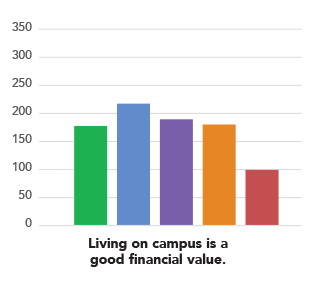
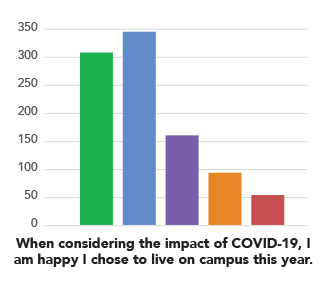

Lockouts
With over 3,500 students on campus this year, inevitably residents are going to lock their room without having their key with them, and need to be let back in by a staff member. With the overall on-campus population being down by over 2,000 students due to the pandemic, we were curious to see how this would impact the overall number of lockouts in the residence hall. Please read the full report for more information.
Housing and Residence Life is continually striving to provide the amenities residents want, while ensuring that financial resources are being devoted to services that will have the most impact for students. As new technologies are developed, HRL technology staff members evaluate student usage and seek feedback on how to best meet student needs.
Residents were surveyed to see what streaming services they use, and what their satisfaction level is with wireless internet service provided in the hall. A few key highlights were:
- 90% of residents rated UNCG’s wireless internet service as “satisfactory” or above. 37% rated the service as excellent.
- Netflix, Youtube, Hulu, Disney Plus, and Amazon Prime all have more resident viewers than the Philo Streaming service HRL provides for students. Over 100 students took the time to write-in HBO Max, which shows this is a popular option for students (also provided by HRL).
Similarly, HRL works to deliver information in formats that will reach the greatest number of students. Students reported learning needed information through emails from HRL, posted signs in the hall, and the website. These three options far surpassed any other medium currently being offered. When asked how they would prefer to learn information, residents listed the same three methods, in the same order. See the full report for more details.
2019-20 Assessment Practices & Highlights
The Office of Housing and Residence Life strives to cultivate a culture of evidence supporting our mission, vision, and values. In conjunction with UNC Greensboro’s strategic plan of “Taking Giant Steps” and the Division of Student Affairs strategic plan we strive to create and maintain healthy, vibrant residential communities conducive to student success.
A significant part of providing a quality on-campus residential experience is to engage in reflective practice through evaluating successes as well as opportunities for improvement. Housing and Residence Life (HRL) endeavors to create an environment where assessment is incorporated in every aspect of our program. Our staff work to make informed, data-driven decisions, based on intentional assessment of our programs, services, and operations. Our department participates in an external program review process every five years, sets yearly goals, and submits an annual report. Through these efforts, HRL is dedicated to continuous improvement.
This website is not comprehensive of all our efforts rather it provides a brief snapshot of our yearly assessment practices and highlights. Information shared is data from 2019-2020 academic year.
* Due to the COVID-19 pandemic, yearly numbers are truncated in some areas as compared to previous years. Unless otherwise noted data was calculated with a March 15th “end date”
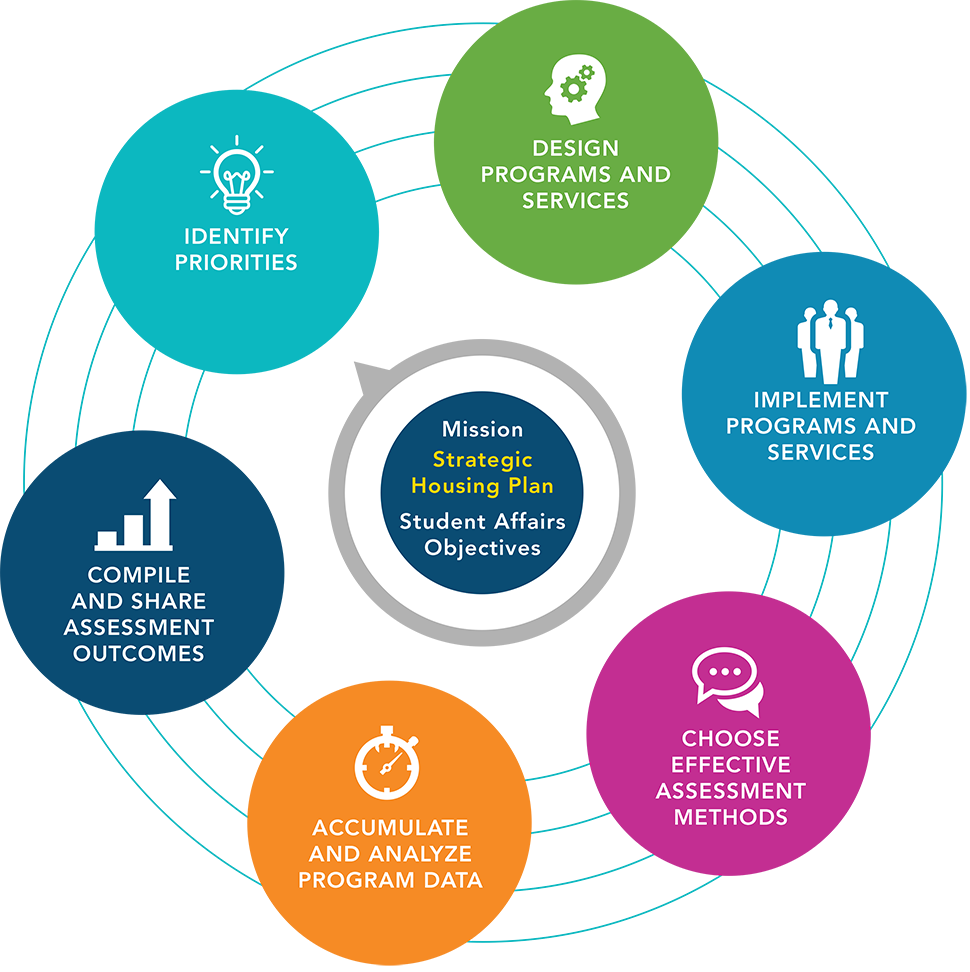
| 2019-2020 Goals |
|---|
| Enhance commitment to a socially just, diverse, and inclusive learning environment throughout the residential campus and general community. |
| Employ an assessment plan that provides data for internal and external audiences, informs decision making, and improves programs. |
| Develop new partnerships with Academic Affairs. |
| Complete design and/or construction of Capital Projects |
| Complete the 2018-2019 Facilities Condition Assessment Plan and develop a 3-5 year R&R renovation/replacement plan addressing concerns. |
| Continue to improve energy efficiency |
| Complete all HRL move-related processes by December 15, 2019. |
| Develop a plan to create an Off-Campus Housing Virtual Office within Housing & Residence Life for 2020-2021 |
| Expand and improve departmental marketing and communications through mobile services. |
| Improve Safety and efficiency through technology upgrades. |
References & Resources
Residence Hall Association (RHA)
RHA serves as a communication line for residential students to meet other residents from the various residence halls on campus, as well as across the state and nation. RHA is the voice and liaison for residential students to connect with Housing and Residence Life administration. It is a way for students to become actively involved in the residential community. They develop leadership skills, communicate ideas, voice the opinions and concerns of their respective halls, plan both hall and campus activities, and make sure that students have a voice on the policies and issues that affect them.
Outreach
Each year RHA choses one challenge to campus or the Greensboro Community to work to help address. For 2019-2020, RHA decided to focus on homelessness. One of the initiatives to help the homeless in and around Greensboro was to collect plastic bags to run into sleeping pads. Our Hall Council members collected over 12,500 plastic bags and was able to make over 20 sleeping mats for those affected by homelessness.
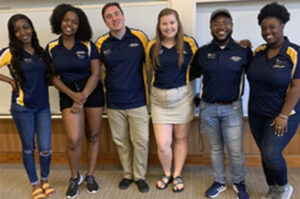
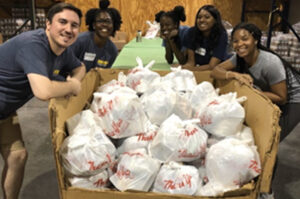
Vagina Monologues Honored as a National OTM Award Winner
Vagina Monologues is an award-winning play and fund raiser hosted by HRL as part of a movement to stop violence against women. In the 2019-2020 year, this event raised a grand total of $3,931.53 well over their projected goal. All proceeds from tickets, t-shirts, baked goods, flowers, canvas paintings and buttons went directly to the Clara House, which is a shelter that serves domestically and sexually abused women and children. The Vagina Monologues team also collected more than 300 boxes/items of feminine hygiene items to donate to the shelter.

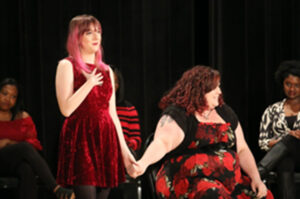
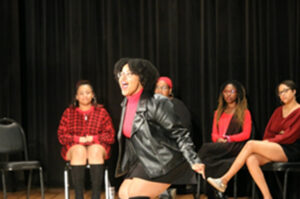
National Residence Hall Honorary (NRHH)
The National Residence Hall Honorary (NRHH) is an Honor Society for the top Student Leaders in Housing. It’s dedicated to making a difference at UNCG and the Greensboro community, loves to recognize others, regularly collects items to give back to the community and volunteers their time to do service projects.
Outreach
In the end of September, NRHH members went to ‘Out of the Garden’ Project to spend time assembling food packages. ‘Out of the Garden’ is a food assistance program for families in primarily Guilford County. This project partners with other organizations, teachers, parents, families and friends to provide food for children in need so that they can grow, learn, and thrive. The ‘Out of the Garden’ Project serves over 1250 families in a month. NRHH members assisted by organizing and assembling over 200 bags of hope for children in need.
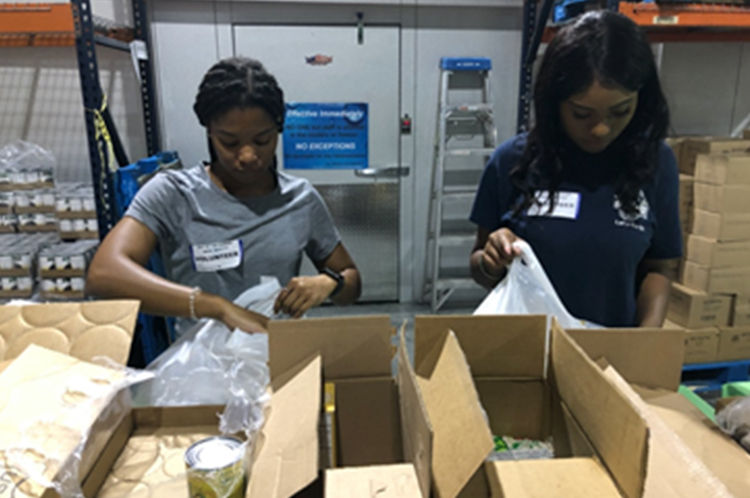
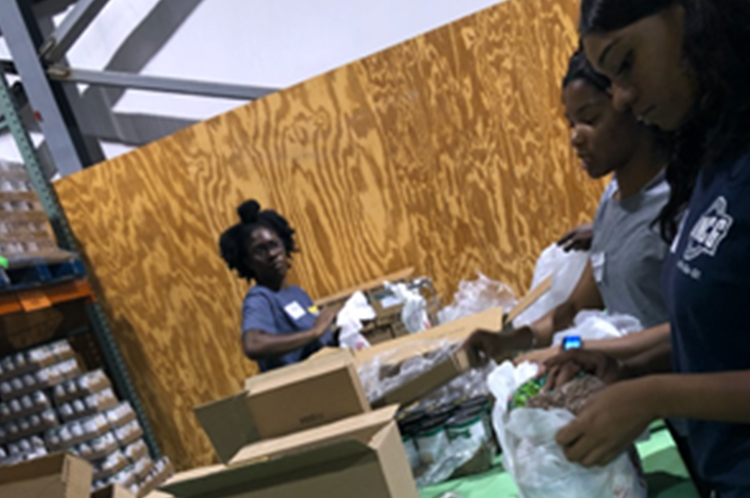
The 2019-2020 RA Training and Development Committee sought to employ a year-long assessment plan that measured the effectiveness of RA training under three core tenets: 1) feelings of confidence from our RAs, 2) ability to connect with residents, 3) confidence in opening the halls. The committee was pleasantly surprised to see that a large portion of RAs already felt confident starting RA training, and those general feelings of confidence continued, with our RAs feeling even more confident after RA training.
Before RA Training, 39.78% of RAs could successfully identify the core values of Housing and Residence Life. After RA Training, 80.85% of RAs could successfully identify the core values of Housing and Residence Life.
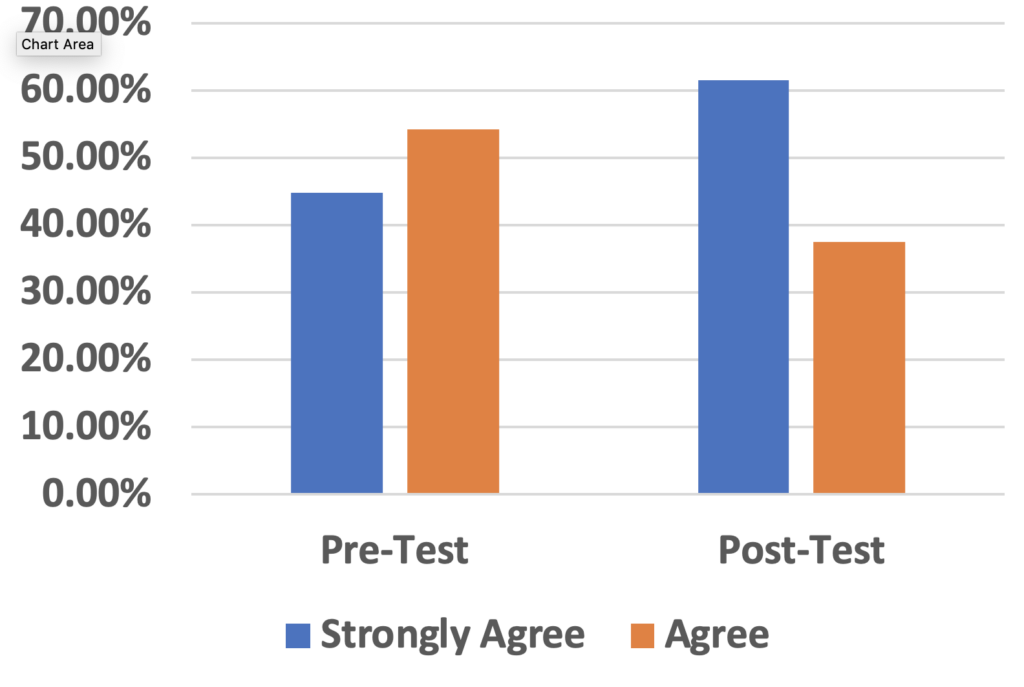
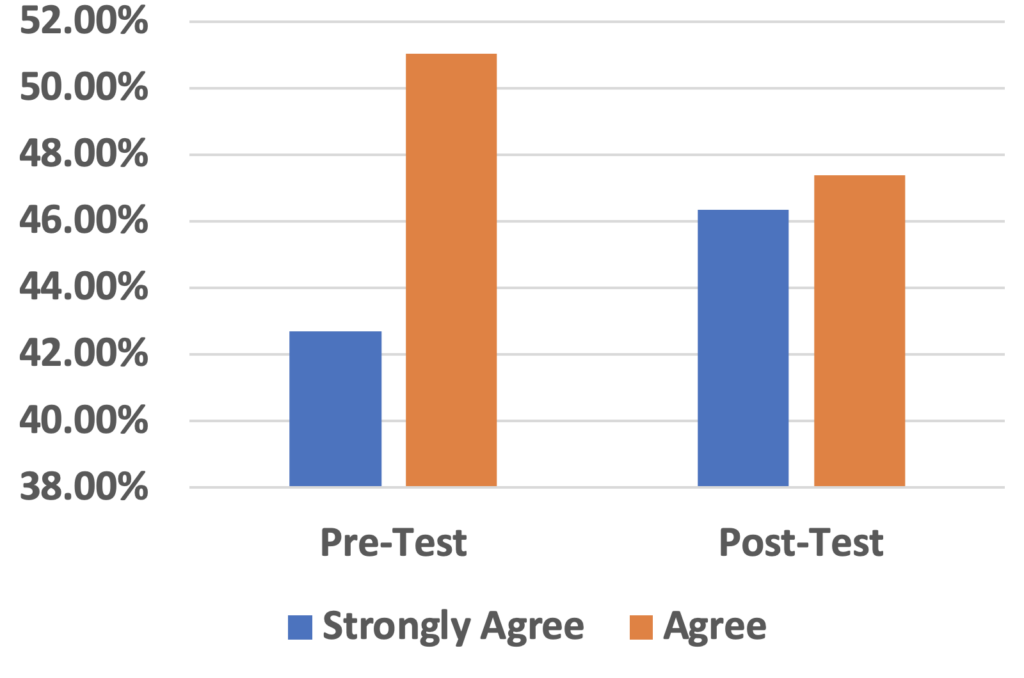
In the Fall 2019 post-assessment, the Behind Closed Doors activity and the Social Justice and Inclusion (SJDI) conference sessions were both evaluated individually on effectiveness for how RAs perceived them to feel applicable to their job. The SJDI conference sessions were newly introduced for Fall 2019 training as an opportunity for Residence Life staff to be able to share their knowledge around these topics and in a space for RAs to intentionally learn about identity or privilege in the RA role. Topics included; difficult dialogue, imposter syndrome, and gender identity. Overwhelmingly, 97.86% of respondents agreed or strongly agreed that attending the SJDI sessions were beneficial to their role as an RA.
97.89% of RAs “Agreed” or “Strongly Agreed” that…
- Behind Closed Doors (BCDs) helped them feel prepared to address policy violations
- The Social Justice and Inclusion mini conference was applicable to the RA role.
Behind Closed Doors (BCDs) is an intentional, experiential learning opportunity for new RAs to work with returning RAs in addressing mock policy violations. Returning RAs serve as actors in the scenario and the New RAs address the situation as they would as an RA and receive feedback on protocol and how to handle the situation. In a similar trajectory to the SJDI sessions, 97.89% of respondents believed that Behind Closed Doors helped them feel more prepared to address policy violations in the RA role. BCDs is an intensive, experiential training method employed in order for RAs to practice what they have learned in terms of policy and situational response.
Evaluation
Resident Advisors are evaluated twice annually (end of fall semester and end of academic year) on 35 individual criterion related to job performance. These criteria are the same in both evaluations, to highlight growth by the resident advisor staff, but also to evaluate the effectiveness of RA Training and on-going professional development. Areas of deficiency across the entire RA staff are reviewed to determine if additional training is needed, or if the area of evaluation is outdated and does not align with what we are asking RAs to do on a routine basis.
Evaluations of Resident Advisors across campus were evaluated to determine overall how RAs were performing in relation to their job expectations. Averages were taken across all the RA evaluations that were analyzed to see if there were consistent areas where staff were performing under expectations. Criteria was quantified on the following scale:
1 = Does Not Meet expectations
2 = Meets Expectations
3 = Exceeds Expectations
Overall, what we found is that the RAs are exceeding expectations in areas where we have put the greatest emphasis. When taking a closer look at the criteria averages, there were six individual criterion from the RA evaluations that averaged a score higher than a 2.0, meaning more RAs were consistently meeting and exceeding expectations:
- RA works to identify and proactively solve problems in their community. These situations may include roommate conflicts, personal problems, and emergencies.
- RA communicates with supervisor and other RA staff members as outlined by HRL and supervisor expectations.
- RA builds rapport within their floor to initiate roommate dialogue, personal growth, and to mediate residential conflicts.
- RA serves in a “helper” role to effectively refer residents to campus resources.
- RA holistically supports residents in academic endeavors, personal well-being, and development/growth.
- RA serves as a positive role model on and off campus.
These criteria encompass traits that HRL prioritizes in the RA role: relationship-building, interaction with residents. communication, and problem solving. This shows the value HRL places on RAs interacting with their residents on a regular basis. Within their community, RAs are aware of issues as they arise and are able to address them in a positive, developmental way.
Conversely, there were three areas in which RAs were not meeting expectations consistently.
- RA meets all implementation requirements of HRL as outlined by the Spartan Community Initiative, supervisor guidelines, and additional activities by the Division of Student Affairs.
- RA has implemented programming that has facilitated faculty engagement with the residential population.The first two criteria are related to programming expectations of our RAs. Lower overall evaluation in this area is not unexpected. The RA role has changed over time, with RAs being asked to connect more personally with their residents, intervene in crisis situations, and be connected on-campus. This focus on individual connection has led to less time being available for the RA to conduct larger-scale programs within the hall. Written RA programming expectations may not be consistent with what supervisors are prioritizing or expecting from staff members.
- RA attended all continuing development sessions.
Additionally, the RA staff is expected to attend Continuing Development sessions throughout the year as extended training opportunities. These have historically taken place on Friday afternoons, and RA attendance has fluctuated due to co-curricular commitments, internships, and classes, which shows the incoming Student Staff Training Committee that this structure and time frame may no longer be conducive to the needs of the RA staff and can potentially be re-evaluated.
Future Considerations
As the Division of Student Affairs moves towards a Curricular Approach model for serving students, Residence Life needs to move the content creation aspect of programming away from Resident Advisors and to content experts on campus. The RA evaluation should be updated to reflect a more accurate expectation of RA staff in these areas.
Additionally, Residence Life needs to reexamine the effectiveness and efficiency of on-going training for Resident Advisors. It will always be difficult to get 130+ student staff members together at the same time throughout the academic year. A model that allows for RAs to gain this additional training at multiple times or on their own should be implemented.
Overall, this assessment shows that our RAs are excelling in the areas that Residence Life has prioritized. RA performance in this regard is one that shows a commitment to the improvement of the student experience on campus, and ensuring that our residents are cared for in their campus homes.
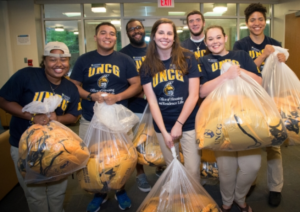
HOUSECALLS
House Calls Initiative Summary
For the eleventh consecutive year, HRL executed one of its major departmental academic initiatives called House Calls. The program welcomes new students (including first time freshman and transfer students) to campus and provides them with an opportunity to interact with faculty members, administrators, student staff, and professional staff on a personal level. The campus and community volunteer partners interact with students in their residence hall, help with resident questions and answers, and provide students with a “welcome bag of success” that is stocked with information and items that assist in the support of their transition to college and their overall academic success.
With the assistance of over 200 volunteers, House Calls provided strategic and meaningful interactions and issued welcome bags of success to over 1,300 students!
| Residence Hall | New Students | TOTAL Home | Percentage Reached |
|---|---|---|---|
| Cone | 320 | 230 | 71.88% |
| Grogan | 256 | 170 | 66.41% |
| Mary Foust | 149 | 107 | 71.81% |
| Ragsdale/Mendenhall | 115 | 79 | 68.70% |
| Moore/Strong | 242 | 159 | 65.70% |
| The Spencers | 237 | 172 | 72.57% |
| Phillips/Hawkins | 272 | 185 | 68.01% |
LIVING LEARNING COMMUNITIES
Overview
The HRL Living Learning Community (LLC) Experience is uniquely designed for new to UNCG students. Its core is a focus on: Academic Excellence, Diversity, Leadership, Service, and Wellness. During the 2019-2020 Academic Year, HRL oversaw 4 LLCs: CONNECT, MADHouse, Impact, and Spartan Wellness with a total of 94 residents participating across these 4 communities. The mission of each LLC can be found below:
- CONNECT: CONNECT is an engaged and intentional residential community designed for matriculating transfer students from first to senior year of any major, and who are seeking ways to be involved on campus. CONNECT offers transfer students a year of opportunities to engage in student leadership, access to campus resources, and community building while focusing on the following principles: Campus Resources, Opportunities for Leadership and Personal Development, Networking, Navigating the University, Engagement in Your Communities, Career Planning, and Transfer Student Success.
- Impact: Impact is a leadership focused living learning community designed to educate future student leaders to be active and engaged members of their community. We will do this by providing a platform to define, expand upon, and display learned ideas of leadership.
- MADHouse: Make A Difference House is a service-learning themed living learning community open to civic-minded UNCG students across academic disciplines who are committed to using service and leadership to make a positive difference in the greater Greensboro community through the application of their academic interests and personal skills.
- Spartan Wellness: Spartan Wellness helps students to form a community committed to learning and demonstrating holistic wellness based on the 8 Dimensions of Wellness model. Holistic wellness informs our personal and academic values, and we empower ourselves and others to make healthy life choices. As members of this community, we will consistently attend and actively participate in scheduled community meetings, workshops, and programs. We will strive for academic excellence and achieve our set goals, as we pledge to be healthy, be inspired, and be well.
Highlights
Overall:
Of the 94 LLC students for the 2019-2020 Academic Year, 25 (27%) completed the End of Year Assessment. Respondents were evenly distributed across the 4 LLCs. The charts to the side compare the survey respondents to the overall LLC population.
When asked how their LLC experience has impacted their experience at UNCG, respondents, overwhelmingly agreed that the experience was beneficial.
- 88% agreed that their LLC assisted in their transition to UNCG
- 68% agreed that their LLC positively impacted their sense of belonging
- 64% agreed that their LLC contributed to their academic success
It is worth noting that while academic success was still generally supported by the LLC experience, it was the weakest of the three measures of student success, as reported by the LLC students.
Student engagement is one of the department’s core focal areas with Residence Life leading the charge to connect and interact with each resident ensuring students have an enriched college experience.
CONNECTIONS
Overview
As student affairs practitioners, we know the single most important factor in determining college success is whether a student feels connected in their university experience. This connection can come with peers, professors, a club or organization, or with their resident advisor (RA). For this reason, Residence Life focuses on creating one-on-one interactions between a resident and their RA. Connections is a qualitative, Resident Advisor-reported, resident-assessment program designed to meet the following goals:
- Ensure all on-campus residents have at least one intentional interaction with their Resident Advisor during the first two weeks of class in the fall and spring semesters.
- Provide large-scale qualitative data to aid in program development, staff training, and improving the overall student experience.
- Create closer relationships between Resident Advisors and their residents.
Key Figures
- 20,692 Connections were documented by Resident Advisors
- 3.7 Connections were reported per resident (average)
- RAs in suite-style (4.22) and apartments (3.66) documented more Connections than RAs in traditional-style halls (3.57)
Qualitative Review
The content of the Connections showed that 44% of Connections were focused on a resident’s academic experiences and 16% of Connections focused on roommate situations. Other common themes found in Connections related to involvement on campus (675) and utilizing campus resources (357). Most Connections appeared to be taking place in the residence hall. Additionally, as COVID-19 began to take hold in our area, there were 192 Connections about COVID-19 related concerns among the residents.
Link to Full PDF Executive Summary – Emailed on 6/11/2020
PROGRAMMING AND EVENTS
Overview
As student affairs practitioners, we know that an important factor in determining college success is whether or not a student feels connected to their university and a sense of belonging. Student involvement can come from experiences in the residence hall, on campus, or in the local community. For this reason, the Office of Housing & Residence Life requires Resident Advisors to create events using the Spartan Community Initiative which focuses on holding intentional programs where residents can learn about campus resources, engage in conversations, and develop meaningful relationships with others. Events are designed to meet the following goals:
- Engage residents in active or passive programming
- Identify and introduce residents to campus resources
- Create closer relationships between Resident Advisors and their residents
Highlights
From when Residents began arriving to campus in Mid-August until Mid to Late March there were 925 Events filed in Roompact and held by RA staff. The event proposal process is made up of multiple steps: pending approval, approval, pending assessment, and completed. Part of the event process requires RAs to submit learning outcomes that can be assessed once the program is concluded thus encouraging intentional programming
Events Per Building:
There is a total of 27 residence hall on UNC Greensboro’s campus which can be categorized into three types of halls – Traditional, Suites, and Apartment. In evaluating the breakdown of Events according to building type,
- 459 were held in Traditional,
- 121 were held in Suites,
- 233 were held in Apartments.
SJDI STATEMENT ACCORDING TO 2019 – 2020 RES LIFE OBJECTIVE & MEASURE:
Housing and Residence Life has adopted a goal to enhance our commitment to a socially just, diverse, and inclusive learning environment throughout the residential campus and general community. A key commitment includes a dedicated HRL Social Justice, Diversity and Inclusion committee; which conducts signature initiatives as “Breaking Barriers” and “Papel Picado,” creates and distributes learning resources such as the SJDI60 Monthly Newsletter publication, and facilitates programmatic campus partnerships such as Tunnel of Oppression.
- Cultivate and expand partnerships with on-campus offices and community resources to provide relevant, intentional programming, and initiatives.
- Created impromptu programming to supplemental UNCG Dining’s Project Clean Plate Week with a Food Insecurity Info Tabling & Raffle
- Partnered with UNCG Office of Intercultural Engagement to plan Tunnel of Oppression
- Provided fiscal and physical support to department and campus partner programs including Vagina Monologues, First G at the G, and the Civil Rights Pilgrimage.
- Develop new and traditional SJDI Committee programming initiatives to name, celebrate, and explore components of social justice, diversity and inclusion throughout the academic year
- Implemented new ideas, marketing, and programming for:
- Hispanic Heritage Month
- Papel Picado
- Black History
- Breaking Barriers (all halls programming from January – March)
- World Day of Social Justice
- Explore additional programming opportunities that may include the development and education of cultural competencies with professional and student staff
- Implemented identity and social justice reflection sessions for new staff members with their Flight Program experience. New team members reflected upon their various identities, how they intersected with one another, how they impacted the Coordinator for Residence Life role, and how their identities and role played a part in promoting social justice on campus and within their residence halls.
- Provided a “Spartan Justice – Social Justice at UNCG” presentation for 2019 RA Training
- Scheduled two social justice related professional development drop in PRISM webinars for professional and graduate staff:
- Topic A – Institutional Strategy & Budgeting for Diversity, Equity, & Inclusion
- Topic B – Discussing Race & Racism in the Workplace
- Produce the SJDI60 Monthly Newsletter Publication
- Six publications from September 2019 – April 2020
- Total of 304 page views and 233 unique page views.
- SJDI60 Newsletters web page
HALL ROUNDS
Overview
As housing professionals, we know that some of the most active times in residence halls are at night when residents are finished with classes and in their rooms for the rest of the day. For this reason, we require our Resident Advisors (RAs), to complete rounds during this period to ensure the safety and well-being of residents when they are most often in these spaces. Sunday through Thursdays RAs complete three rounds at 7pm, 10pm and 12am. On Fridays and Saturdays, RAs complete an additional fourth round at 2am.
Hall Rounds are conducted in order to meet the following goals:
Create an active presence in the Residence Halls to ensure the well-being and safety of Residents during peak activity times.
Ensure there are no facility concerns that could jeopardize residence safety such as out of order equipment or inactive light bulbs
Provide qualitative and quantitative data about the state of Residence Halls during the round periods.
Being locked out of your room is one of those things that is bound to happen while living on campus. For many of our students, that happens once and then never happens again. For some students, that’s not the case and they become frequent visitors to our front desks or calls to the RA Duty phone. The chart below shows the frequency in which some students were locked out of their rooms. A total of 761 students had multiple lockouts submitted on their behalf, broken down from two, three, or four or more, with the highest being one student who had 12 lockouts submitted throughout the academic year.
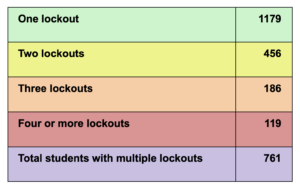
ROOM CONDITION REPORTS
This report gives an examination of the Room Condition Reports (RCRs) submitted by residents in Roompact within the 2019-2020 Academic Year. These forms allow housing administrators to review the condition of spaces and is primarily referred to while assessing damage after residents have moved out, so that residents will not be billed for pre-existing damage in a space. These forms are intended to be completed within 72 hours of a student moving into a space, and they provide an array of specific categories to prompt a thorough review of their space. The form also encourages residents to upload photos.
Between August 2019 and March 2020, there were a total of 1,274 individual RCRs completed in Roompact (dates were affected by the early closure of the halls in response to Covid-19).
FACILITY RENOVATION
This year, facilities completed a three phase fast paced renovation of Ragsdale/Mendenhall and the Housing and Residence Life Central Office. Beginning in the summer of 2019, chilled water lines from Moran Commons and the Quad were extended underground to serve the building. While occupied, phase 1B of the project commenced in the basement so piping rough-ins and large HVAC equipment could be set. Shortly after completion of fall semester, all residents were relocated, and the entire building was turned over to the contractor for an extensive 7-month renovation. The renovation of Ragsdale Mendenhall included:
- Complete replacement of HVAC system
- New aluminum windows
- Installation of a new passenger elevator
- New backup generator
- Replacement of all student room plumbing and vanities
- New finishes throughout including carpet, doors and hardware, paint, and student room furniture.
TIMELY COMPLETION OF WORK ORDERS
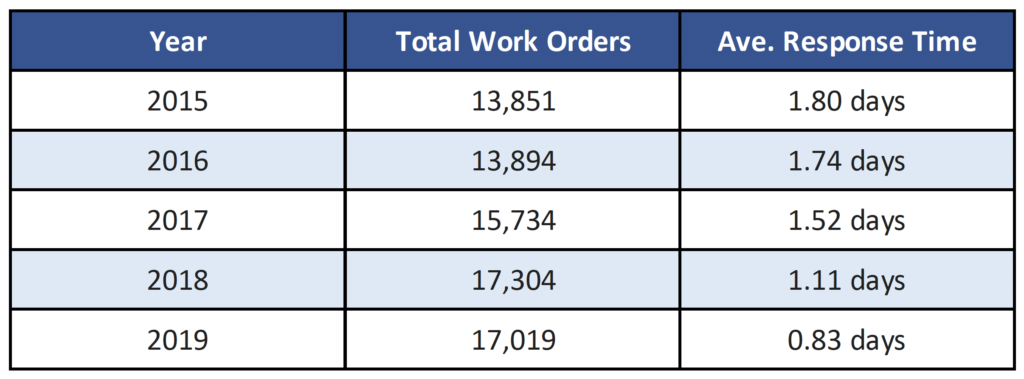
Housing and Residence Life strives to continue providing exceptional customer service while remaining a relatively small facilities staff. With the recent hiring of several vacant positions, load balancing optimization of PMs, we have further reduced our overall response time to work orders from all areas of Housing (Maintenance, Project Office, Housekeeping, and IT).
ROOM CHANGE
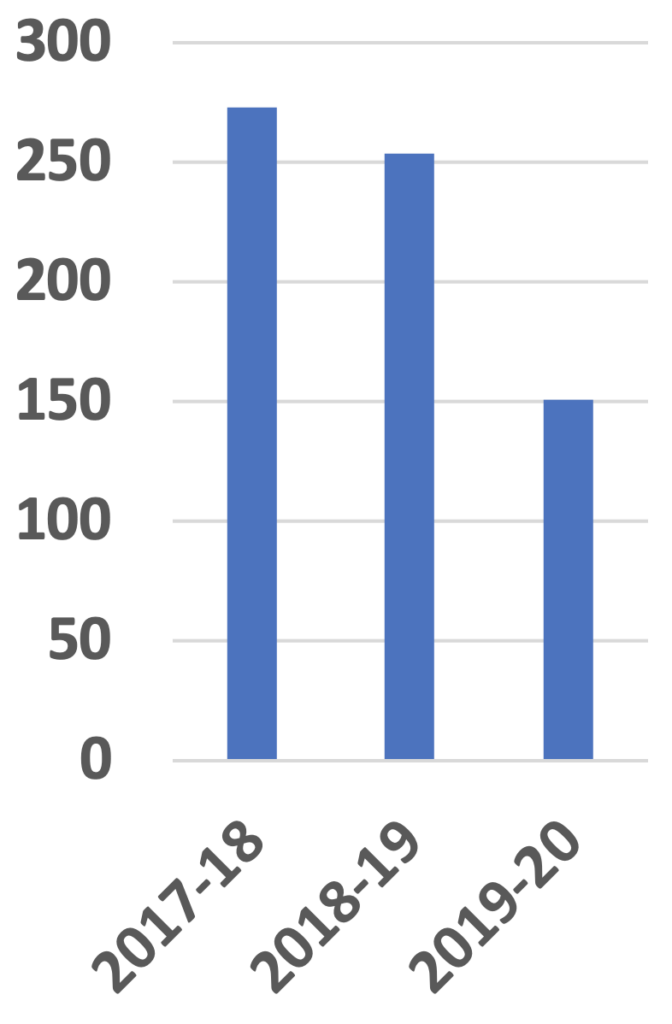
This year provided a number of anticipated and unexpected challenges for HRL assignments staff. With 288-bed Ragsdale/Mendenhall Residence Hall closing for renovation in December of 2019, these students had to be relocated. As space became available in other halls throughout the fall semester, these students were given the option to move. At the end of the fall semester, 237 students who remained in the hall were relocated to other spaces throughout campus. These spaces were available in the spring due to residents graduating or leaving the halls for other reasons.
In Fall 2019, there was not an open room change process, due to students in temporary housing and students in Ragsdale/Mendenhall who had priority to be moved. Residents who needed immediate relocation were permitted to move into Ragsdale/Mendehall, with the knowledge they would need to relocate in December. This lowered the overall number of room changes.
There was also a decrease in room changes in January despite residents being able to participate in an open room change process. This could be attributed to fewer spaces being available due to the large number of residents from Ragsdale/Mendenhall who were relocated at the end of 2019.
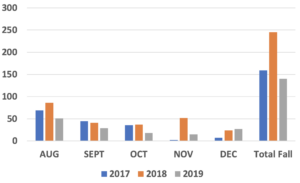
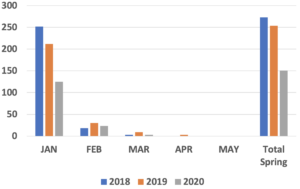
* COVID-19 impacted room changes in March, April and May of 2020.
In 2019, Housing and Residence Life hosted 23 camps and nine freshmen orientation sessions. Camp sizes ranged from as few as eight participants to as many as 1046 and included new groups as well as long standing established UNCG affiliated camps. While there was an overall decrease (6.94%) in the total number of participants, there was an increase in the revenue to HRL which can be attributed to the larger number of non-UNCG interns that lived in HRL housing.
HRL recognized the need to provide housing for interns either studying at UNCG or working in the Greensboro community and has worked hard to establish relationships with local employers. In 2019, HRL housed 53 non-UNCG interns from NC and around the country while in 2018 there were 20.
Below is a chart comparing the data for summer activity in 2018 and 2019.
| Name of Group | Number of Participants in 2018 | Number of Participants in 2019 | % Change |
|---|---|---|---|
| All Arts-Sciences, Technology Camp | 202 | 185 | -9.19% |
| Appalachian State Upward Bound | 41 | 41 | 0.00% |
| Carolina Soccer Camps * | 411 | ||
| Computational Number Theory | 14 | 8 | -75.00% |
| DCCC Upward Bound | 18 | 19 | 5.26% |
| E3 Soccer Camp – elite * | 47 | 100.00% | |
| E3 Soccer Camp – team * | 65 | 100.00% | |
| EdD in Kinesiology Orientation | 22 | 20 | -10.00% |
| FJM Summer Clinic * | 43 | 100.00% | |
| iD Tech * | 12 | 100.00% | |
| Interns – non UNCG students | 20 | 53 | 62.26% |
| Math-bio REU | 9 | 6 | -50.00% |
| McNair Research | 9 | 11 | 18.18% |
| Music Camp 1 | 1,086 | 1,046 | -3.82% |
| Music Camp 2 | 1,079 | 1,019 | -5.89% |
| NC Sports Medicine | 58 | 66 | 12.12% |
| PGC Basketball * | 99 | 100.00% | |
| Sharks Swim Club * | 31 | ||
| SOAR 9 sessions & staff | 3,349 | 3,103 | -7.93% |
| Spartan StartUp | 46 | 29 | -58.62% |
| Summer Arts and Designs Intensive | 75 | 85 | 11.76% |
| Summer Dance Technique | 7 | 10 | 30.00% |
| SUS Sport Exchange | 23 | 23 | 0.00% |
| UNCG Chance | 142 | 196 | 27.55% |
| UPCEE Upward Bound | 54 | 73 | 26.03% |
| Volleyball | 38 | 38 | 0.00% |
| *Group not here in relevant year | 6734 | 6297 | -6.94% |
DIGITAL DISPLAYS IN THE RESIDENCE HALLS
In 2019, Housing and Residence Life dedicated digital displays in the residence halls for marketing in prime traffic areas. Rise Vision software was installed on Mac Raspberry pies and the displays were tested in 3 residence halls. Soon after, the software was added to displays in 15 halls, the maximum coverage available under our current contract.
Housing and Residence Life offered advertising space to campus partners at no cost (to UNCG students, faculty, staff, student groups, college departments, academic units, and college-affiliated organizations). Groups submitted digital images using a reservation form to be displayed on the TVs in the residence hall community in accordance with the Digital Display Posting Policy.
In its first year, HRL displayed 59 advertisements, 29% of which were from the Office of Housing and Residence Life, while 71% were from campus partners.
WEBSITE (HRL.UNCG.EDU)
Traffic
- Sessions = The number of visits to the site
- Users = The number of visitors to the site
Goal: The goal is to show steady improvement over time.
Site traffic is a basic measurement of a site’s reach and growth and can be studied over time as a general way of determining the effectiveness of marketing efforts. It shows an overall snapshot of the website’s performance. Since 2010, hrl.uncg.edu has seen an upward trend in the number of users, as well as the number of sessions on the site as follows:
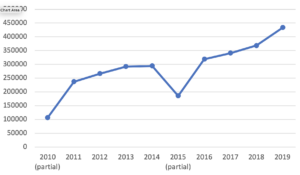
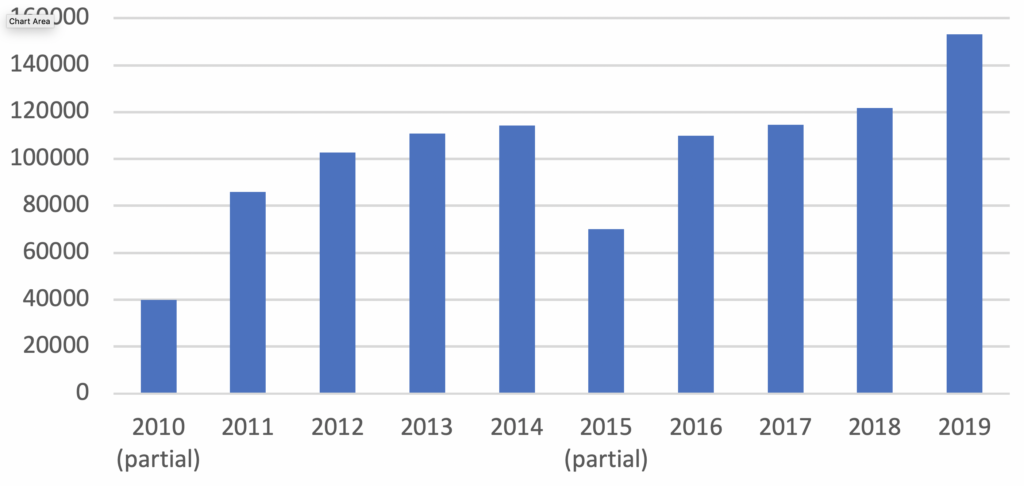
(Note: 2015 data represents partial information due to a change in analytic data collection methods. A predicted measurement is shown.)
Pages Per Session
How many web pages users view upon each visit to the site
Goal: The unofficial industry standard is 2 pages per session.
The goal is to keep users engaged in the site and to get them to explore next steps or further information. In a nutshell, pages per session indicates interest in UNCG’s housing and residence life information. Since 2010, the number of pages per session meets industry standards.
*Variability in this area may be a function of site redesign. Content was redesigned to maximize efficiency in finding content. In other words, users don’t have to search through as many pages to find the information they seek.
Average Session Duration
Average Session Duration = the average amount of time users stay on the site
Goal: For a good average session duration, the industry standard is 2 – 3 minutes.
Longer session durations indicate more engaged visits. Basically, how much time users are willing to give to the content. The website remains solidly within the industry standard with regard to the amount of time users stay on the site.
*Variability in this area may be a function of site redesign. Content was redesigned to maximize efficiency in finding sought content. In other words, it may take users much less time to find the information they seek.
Important Notes:
*Redesign and Site Consolidation Dates:
| Date | # Web Pages | Notes |
|---|---|---|
| Jun. 2010 | 502 | Very limited content, poor functionality |
| Jan. 2011 | 3,400 | All content gathered, generated, and presented |
| Dec. 2014 | 219 | Switched to WordPress, content consolidated/functionality improved with plug-ins |
| Sept. 2016 | 140 | New Responsive design. Further consolidation for mobile devices |
| 2017-18 | 177 | Page totals remain fairly consistent and unaltered |
| Mar. 2019 | 236 | Restructured all photos into sliders; Consolidated all residence halls pages; Added digital assessment book and SJDI Newsletters |
Mobile Device Usage
Since 2010, there has been an almost steady rise in the use of mobile devices to access web content. In 2019, more than 60% of users accessed the website with mobile devices. In order to provide increased ease of use for a mobile platform, a responsive design should be considered for all content. The only areas that remain unresponsive include the FIXT Work Request system and the Mercury application, both of which are third-party software.
Summary of Findings
Since 2010, goals for the HRL website have been met consistently.
- Site traffic shows steady improvement over time.
- There has been an upward trend in the number of users, as well as the number of sessions on the site.
- The number of pages per session have consistently doubled industry standards.
- The website remains solidly within the industry standard with regard to the amount of time users stay on the site.
Impressions
Twitter impressions refer to the actual interaction or engagement generated once a tweet has been posted to various Twitter streams – the interaction or replies from others online. This chart compares the HRL Twitter impressions from 2016 to 2019. Twitter was used more aggressively to promote information beginning January 2017, based on the decreased interest in Facebook.
Engagement Rates
Engagements are the total number of times a user interacted with an HRL Tweet. (Clicks anywhere on the Tweet, including Retweets, replies, follows, likes, links, cards, hash tags, embedded media, user name, profile photo, or Tweet expansion.) Engagement rates represent the number of engagements divided by the number of Twitter impressions.
URL Clicks
URL clicks refer to the number of times users click on a URL (web address) in a Tweet that links to our HRL website content. This chart shows URL clicks from 2016 – 2019.
2018-19 Assessment Practices & Highlights
The Office of Housing and Residence Life strives to cultivate a culture of evidence supporting our mission, vision, and values. In conjunction with UNC Greensboro’s strategic plan of “Taking Giant Steps” and the Division of Student Affairs strategic plan we strive to create and maintain healthy, vibrant residential communities conducive to student success.
A significant part of providing a quality on-campus residential experience is to engage in reflective practice through evaluating successes as well as opportunities for improvement. Housing and Residence Life (HRL) endeavors to create an environment where assessment is incorporated in every aspect of our program. Our staff work to make informed, data-driven decisions, based on intentional assessment of our programs, services, and operations. Our department participates in an external program review process every five years, sets yearly goals, and submits an annual report. Through these efforts, HRL is dedicated to continuous improvement.
This website is not comprehensive of all our efforts rather it provides a brief snapshot of our yearly assessment practices and highlights. Information shared is data from 2018-2019 academic year.

| ANNUAL HRL GOALS |
|---|
| Create new strategies to engage students who are traditionally unengaged. |
| Expand focus on service and student engagement. |
| Promote assessment within the department to provide data for informed decision making and improve programs. |
| Enhance commitment to a socially just, diverse, and inclusive learning environment throughout the residential campus and general community. |
| Expand partnerships with academic colleges and departments of University. |
| Design, construct, and open new and renovated residential space. |
| Improve housekeeping practices to raise level of cleanliness of residence halls. |
| Assess short and long term facilities conditions to update short and long term strategic housing facility plan. |
References & Resources
Housing and Residence Life promotes learning and personal growth through programs that enable students to acknowledge and appreciate diversity through open dialogue, establish a personal sense of interdependence, and prepare them for responsible service as members of the global community.
The Skyfactor Residential Assessment is administered every other year to all residential students. The Skyfactor Resident Assessment Instrument was developed in partnership with ACUHO-I and is designed to measure the impact of services including, hall programming, room assignments, food services, engagement with peers, and facilities. It is based on 20 years of research experience. This summary includes findings from Fall 2018.
RESIDENCE LIFE STAFF INTERACTIONS
One of the keys to the experience for students living in the residence halls are the educational and social programs provided. It represents one of the core values for residence life in conjunction with developing meaningful relationships. Of students surveyed, 63.2% attended at least one resident hall program or event.
There were a series of questions asked about their satisfaction with the types of programs offered. Respondents were moderately/very satisfied with the following types of programs:
- 55.6% quality of programs
- 54% variety of programs
- 53% social/educational/cultural
- 39.8% athletic/recreational activities
Further 58.4% of students felt that living on campus positively contributed to their learning and 56.4% felt it contributed to their sense of belonging.
Specific to staff experience respondents reported the following:
- 70.6% promoting tolerance
- 67% were happy with ability to organize programs/activities
- 65% help with problems
- 62% getting to know them
An area of opportunity in their staff experience was RA contribution to community (22.8%).
| CLASSIFICATION | |
| Freshman | 2946 |
| Sophomore | 1262 |
| Junior | 835 |
| Senior | 592 |
| RACE | |
| White | 2040 |
| Black/AA | 2404 |
| LatinX | 266 |
| Asian | 202 |
| Multiracial | 706 |
| SEX | |
| Female | 3923 |
| Male | 1774 |
| CLASSIFICATION | |
| Freshman | 969 |
| Sophomore | 623 |
| Junior | 463 |
| Senior | 275 |
| RACE | |
| White | 836 |
| Black/AA | 983 |
| LatinX | 265 |
| Asian | 75 |
| Multiracial | 706 |
| SEX | |
| Female | 1829 |
| Male | 502 |
| Transgender | 18 |
| Other | 11 |
CAMPUS SAFETY
The Skyfactor survey contains a series of questions with regards to safety. Respondents to the survey reported the following related to safety an security:
- 85% felt safe in their room
- 82.2% were satisfied with security and possessions in room
- 79.9% felt safe in residence hall
- 36.6% felt safe walking on campus at night
The campus level perception of security is in line with other instruments where students do not feel safe on campus at night NCHA (24.6%). The daytime statistic is significantly higher at 74.9%.
PERSONAL INTERACTIONS
One of the outcomes for living on campus should be increasing the diversity of interactions students have with their peers. Residents reported the following in terms of their experience:
- 71.1% felt it contributed to their ability to live cooperatively
- 69.3% felt accepted by other students
- 62.6% felt it improved their interpersonal relationships
- 61.4% felt living on campus contributed to their ability to meet other people
- 57.9% felt it contributed to their ability to resolve conflicts
One specific area of focus in the survey is the contribution of housing with increased diverse interaction. Respondents to the survey reported the following with relationship to diverse interactions:
- 69.7% felt it contributed to their interaction with someone different than themselves (race, gender, beliefs)
- 65.7% felt they benefited from the interactions with residents different than themselves
- 50.8% felt it contributed to their understanding for putting themselves into another persons place/position
FACILITIES
The type of facilities available to students impacts their experience significantly. The Skyfactor survey also asks questions about the facilities and also support staff interactions. Respondents reported high satisfaction with support staff:
- 79.9% were satisfied with cleaning staff
- 68.3% were satisfied with timeliness of repairs
- 54.1% were satisfied with cleanliness of the floor/public spaces
- 52.6% satisfied with cleanliness of bathroom facilities
In terms of facilities:
- 69.1% were satisfied with their degree of privacy in their room
- 67.5% were satisfied with study facilities
- 62.6% satisfied with Internet connectivity
- 58.6% were satisfied with laundry facilities
- 45.7% were satisfied with cable TV options
The room sign up process represents another aspect of facilities interaction which can impact student experiences in the residence halls. Students reported the following:
- 62.6% were satisfied with the building
- 56.3% were satisfied with room type
- 50.6% felt the process was easy
- 49% were satisfied with quality of choices
CONCLUSIONS
The survey results indicate there are both areas of strength and opportunity in facilities and programs for residence life. Students express a very high degree of satisfaction with the quality of interactions with Residence Life staff but low satisfaction with programming.
Looking specifically at the contribution that housing plays on student interactions, students were mostly satisfied however there were lower levels of satisfaction specific to empathy and conflict management. Further students were moderately satisfied with the facilities but reported higher degrees of satisfaction with staff.
WHAT’S NEXT
In the next year, Housing and Residence Life will work to develop programs and make adjustments to improve students satisfaction in their experience. There are plans to develop social norming campaigns about safety, sustainability, peer interactions, alcohol and other drugs, among other priorities. The programming structure and model is also under consideration for revisions. Within the constraints of building design, facilities is focused on ways to improve quality of living experiences for students.
We actualize our mission to promote learning and encourage academic excellence by designing residential academic initiatives that integrate curricular and co-curricular opportunities for students. Housing and Residence Life intentionally dedicates a Senior Assistant Director for Academic Enhancement to provide leadership for this area in conjunction with a diverse group of live-in professionals, graduate assistants, and faculty. The following includes assessment data and highlights of significant initiatives implemented this year.
HOUSE CALLS
House Calls is a signature event developed by HRL to welcome new first year students to our residence halls with the help of campus volunteers during the start of Fall semester. Faculty, administrators, alumni and friends go door to door visiting new Spartans in their new home away from home ensuring they feel the culture of care at UNC Greensboro. Students get their questions answered and receive a customized drawstring bag with items to support their academic success.
Fall 2018 House Calls
Monday, August 20, 2018 marked the 10th annual House Calls to take place in residence halls across campus.
Snapshot
- 94 Volunteers Registered for House Calls
Exceeded target goal of 80 volunteers - 30% of total volunteers were faculty members
- 49% Returning Volunteers
- 40 different Offices & Departments
- Total 2306 new first year residents to visit the day of House Calls
- 1,642 residents were home when volunteers arrived
Fall 2018 Goal
A target goal of 60% residents at home was set in order to increase the average of 54% from over the past eight years of data collection.
In August 2018, we exceeded our target goal with 71.2 % residents at home which is a 12.5% increase from the previous year. This increase perhaps was due to the longevity of the House Calls program with new students arriving at summer orientation already knowing about this signature event. Marketing strategies and incentives were similar for the past few years except for the use of social media and an email blast and printed yard signs were posted as reminders the day of the event. We hope to continue to meet and exceed our target goal in the future.
HOUSE CALLS 2018 SURVEYS
Three surveys were administered electronically to target student population, resident advisors, and volunteers to gauge satisfaction and feedback for improvement.
Survey Results at a Glance
Total Response Rates
- 18% response rate (386 of 2306) Student Survey
- 54% response rate (51 of 94) Volunteer Survey
- Resident Advisor (RA) survey response did not yield significance
- 34% stated email was top communication for House Calls followed by residence life staff at 29.35%
- 83% were very satisfied to satisfied to meet members of the UNCG community during House Calls
STUDENTS
Categories below were created using participants wording in response to the question: What was the most enjoyable component of House Calls?
- Being able to meet people and interact with professors
- Someone to welcome me to UNCG
- Speaking with police officer(s)
- Getting free stuff (swag bags, scantrons, staplers, pens)
- Made me feel at home
- Friendly staff
The majority of respondents stated they did not have suggestions for improving the program. Suggestions given in summary:
- More free gifts include candy, snacks, coupons
- Timing of volunteers (too short, exact time of arrival desired, earlier)
Student Quotes
What was the most enjoyable component of House Calls?
“Feeling like I was home.”
“Talking to the police officer”
“I liked getting to speak with the assistant dean of the honors college! It felt very personal and was really cool to meet her ..to give me encouraging words.”
“The concern HRL showed about how I was assimilating to college life.”
VOLUNTEERS
Volunteer Quotes
Describe your most enjoyable component of House Calls or a “story” you wish to share.
“Seeing the excitement on the students’ faces was a great feeling. I think they appreciated that staff took the time out to welcome them.”
“Fantastic opportunity to interact with students, get some energy from them, and remind ourselves of why we are here. Everyone should take the opportunity to participate and to be reinvigorated by the great [students] that are coming to UNCG.”
“I am used to working with students in crisis or seeing them not always at their best; it was amazing to have the chance to see students within their living space who seemed excited and thriving so far at UNCG. Very energizing!”
“I loved the student interaction and hearing first hand where students were from and how they decided to come here. Their stories create pride in working for UNCG! They were all so excited, polite and appreciative. Super awesome experience! Happy students=happy alumni!”
Volunteer Survey Snapshot of Results
- 100% would participate in House Calls again
- 98% would recommend this first-year initiative to colleagues
- 94% rated overall experience with House Calls very good to excellent
LIVING-LEARNING COMMUNITIES (LLCS)
LLC’s are uniquely designed for new first-year/transfer undergraduate students with a growing focus on the sophomore experience. The HRL LLC program consists of seven communities that explore themes related to diversity/social justice, holistic wellness, service-learning, leadership development, career exploration, and global engagement.
HRL LLC 2018-19 Snapshot
- 112 Total Applications
- 78 Fall 2018 Enrolled
The program experienced a significant drop in enrollment from Fall 2017 of 158 LLC participants. There were a total of 9 LLC’s in 2017 compared to 7 for 2018-19 school year. Other reasons for decline can only be speculated. In lieu of this decline, we enhanced our marketing and recruitment strategy for the 2019–2020 recruitment cycle. As of May 2019, we are seeing an increase in the number of applications prior to new student orientation which begins in June 2019.
LLC END OF THE YEAR (18-19) PARTICIPANT SURVEY
Survey Results Highlight
The survey received a total of 31 responses out of the 70 enrolled as of Fall 2018. The LLCs represented in the responses were Connect, Global Village, Impact (FY/SO), Make A Difference House, Mosaic, and Spartan Wellness.
- 35.5% considered themselves first-generation college students (neither parent/guardian completed college)
- 26% were currently student employees at UNCG
- 39% worked off-campus during the academic year
- 45% stated the Housing Application was the primary mode of communication of learning about LLCs
Direct quotes from students when asked “why they joined a LLC”
“I joined Connect because I was worried about adjusting as a transfer students.”
“I wanted to make friends and serve my community at the same time”
“I joined Global Village to further study my language of interest and allow me to be active in the campus community.”
“I wanted to become more engaged as a leader, so I joined Impact”
“I joined Mosaic because I felt it was more in-tune with my beliefs and morals
Student engagement is one of the department’s core focal areas with Residence Life leading the charge to connect and interact with each resident ensuring students have an enriched college experience.
CONNECTIONS
As student affairs practitioners, we know the single most important factor in determining college success is whether or not a student feels connected in their university experience. This connection can come with peers, professors, a club or organization, or with their resident advisor (RA). For this reason, Residence Life focuses on creating one-on-one interactions between a resident and their RA. Connections is a qualitative, Resident Advisor-reported, resident-assessment program designed to meet the following goals:
- Ensure all on-campus residents have at least one intentional interaction with their Resident Advisor during the first two weeks of class in the fall and spring semesters.
- Provide large-scale qualitative data to aid in program development, staff training, and improving the overall student experience.
- Create closer relationships between Resident Advisors and their residents.
25,686 total documented connections
- Average of 6.2 per freshmen student
- 202 Connections per RA – Campus-wide
Showing the importance of full-time professional staff, in the three halls where professional staff members departed mid-year Connection reporting for these halls was 21% lower than halls where the professional staff members remained consistent throughout the 2018-2019 academic year.
Key Findings
- The majority of interaction between a resident and their RA happens within the hall.
- The most common issues RAs report discussing with students are: navigating campus and their academic experience, living with a roommate, and getting involved on campus.
- RAs find it harder to connect with upperclass students, and students living in apartments. These RAs are more likely to plan events or activities to draw residents out of their rooms for short periods of time, to make connections.
RESIDENCE HALL ASSESSMENT
One of the goals for Residence Life is to promote a culture of assessment by which each residential community and committee implement at least one assessment project for the academic year. The following are a few of the 2018-2019 projects:
Cone Hall
Focus Area
Resident Satisfaction / Community Interests
Target Population
Cone Residents (350)
Dates of Assessment
- August 8, 2018- Cone Hall Opening Survey
- March 27, 2019 – Studio 91 End of Year Survey
Response Rates
62 and 45 responses per survey
Executive Summary
This project aimed to assess the expectations of Cone Hall residents regarding level of engagement and resources provided by living in the theme community, Studio 91, for students interested in the Arts. To also, assess residents’ satisfaction with community programming.Earlier survey results were used in real-time to indicate adjustments to programming and Studio 91 management. Since this was the first year of Studio 91, trends indicated in the opening survey and use of Skyfactor results provided context for resident engagement and recommendations on how to address areas for improvement.
Key Findings
The following includes Cone Hall Skyfactor data collected in November 2018.
- 73.85% of one sample indicated interest in Studio 91, either due to personal interest in the arts (13.85%) or from belonging to a major in the College of Visual and Performing Arts (60%) [Cone Hall Opening Survey].
- 88.71% of one sample indicated an anticipation of using Studio 91 dedicated spaces, including the Dance Floor Meeting Room (20.97%), the Music Composition Lab (11.29%), the Art Room (19.35%), and the Rehearsal Rooms (37.10%). [Cone Hall Opening Survey].
- Average satisfaction for programming in the building consistently fell significantly below the aggregate mean for satisfaction for programming for residential students on campus with deviations of -0.33 to -0.67 across a variety of and quality of programs. Most notably, the greatest negative difference for the building occurred with a -1.48 deviation below the aggregate mean for “As a result of your living-learning community, you are better able to: Connect with faculty/instructors”; However, for the one upper-class floor, the satisfaction with programming was greater than the aggregate mean (with the exception of athletic/recreational activities).” [SkyFactor/EBI Survey]
- At the end of the year, a resident sample indicated that within a week, 26% use the dance room, 40% use the practice rooms, 17.78% use the art room, indicating a greater percentage of use of the dance room and practice rooms from the anticipated use from the beginning of the year, and less use of the art room than was anticipated in the opening survey. [Studio 91 EOY Assessment SP 19]
- The sample’s most significant recommendation for programming next year was to do more CVPA programming (37.78%), and it’s 2nd greatest recommendation was to do more programs related to people of any major (26.67%), with the 3rd recommendation being more programs that show off students’ talents (20%). [Studio 91 EOY Assessment SP 19]
- 55.56% of the sample indicated that there was a time during the year where they considered initiating or hosting a program. [Studio 91 EOY Assessment SP 19]
Implications
Results from the Cone Hall Opening Survey and SkyFactor/EBI survey have been used to guide programmatic efforts in the Spring semester, including two CVPA Professor hosted programs. Pursue greater engagement of CVPA professors early in the year. Make resources available for resident-generated programming, particularly in Studio 91 spaces.
Grogan Hall
Focus Area
Resident Experience
Target Population
Grogan Hall Residents
Dates of Assessment
March 21 – March 29, 2019
Response Rate
24 responses
Executive Summary
Grogan Residence Hall is home to the Grogan Residential College (GRC) whose residents are on six of the eight floors leaving approximately 80 students who are non-GRC members. The Coordinator for Residence Life of Grogan Hall wanted to learn more about the similarities and differences in the experiences of GRC and non-GRC members. The survey was designed to gauge residents’ sense of inclusion and knowledge of the overall Grogan Hall experience. This was determined through a series of multiple-choice questions followed by an optional short answer question at the end to elaborate on any additional issues.
Key Findings
- 14 of the 24 responses were from non-GRC students
- 33.3% knew the Director of GRC and 37.5% knew the Associate Program Chair
- 100% could identify the Grogan Mascot
- 50% knew the GRC theme
- 62.5% felt included in Grogan activities and events
Potential Implications
To increase the non-GRC students’ exposure to the Grogan Residential College faculty and events Enhance the communication regarding the Grogan Hall experience to all residents.
Jefferson Suites
Focus Area
Academic Connections
Target Population
Jefferson Suites Residents (336)
Dates of Assessment
February – March 2019
Response Rate
99 responses
Executive Summary
During the February 1- March 15th Connections deadline, Jefferson Suites RAs asked four academic-related questions. The conversation questions centered around residents’ satisfaction with their academic performance in the Fall semester and what may have/have not contributed to their satisfaction. Residents were then asked to reflect on their current academic performance in the Spring 2019 semester and what may be contributing to their satisfaction in performance. A scale was created (not satisfied to satisfied) and then responses were coded.
Key Findings
51/336 students reported being somewhat satisfied with their academic performance.
- 4 had a 3.5 GPA or higher
- 15 had a 3.49 – 3.0 GPA
- 14 had 2.99-2.5 GPA
- 18 had a 2.49 GPA or lower
- Range: 3.976 – 1.556 GPA
- Average: 2.662 GPA
48/336 students reported not being satisfied with their academic performance
- 4 had a 3.5 GPA or higher
- 13 had a 3.49 – 3.0 GPA
- 14 had 2.99-2.5 GPA
- 17 had a 2.49 GPA or lower
- Range: 3.805- 1.304 GPA
- Average: 2.638 GPA
Mary Foust/Guilford
Target Population
Hall Council committee chairs and executive board
Focus Area
Student Leadership
Executive Summary
The 2018-2019 Ashby and Strong College Assessment Initiative focused on correlations between leadership development and student engagement. Specifically, each Hall Council Project Committee Chair had the opportunity for one-on-one leadership training with the Residential College Coordinator. The training included collecting processes and timelines for Hall Council signature events to create a Handbook for use by future Project Committee Chairs. The presumption was that Chairs who signed up for the leadership training would (a) develop clear, concrete action plans, (b) productively revise action plans during post-Project assessment, and (c) engage effectively with the Residential College community in terms of recruiting participants and overall satisfaction with the Project programming.
Dates of Assessment
September 21-March 31
Response Rate
6/11 (Ashby) & 4/7 (Strong): 54% & 57%
Key Findings
The Committee Chairs who participated had a clear advantage in terms of the positive production, reception, and impact of their projects. Production schedules ran relatively smoothly, challenges were caught in advance, attendance was strong, and Chairs were satisfied with their performances. Chairs who chose not to participate had less well planned and attended programs, and less overall engagement with their leadership opportunities.
Implications
The production of the Leadership Handbooks over the Summer of 2019 will provide tangible procedures for the Residential College co-curricula, and articulate the stakes of student leadership specific to the Colleges. Residential College faculty and staff will develop specific training and orientation for the Project Committees beyond that of the general Hall Council leadership training. This training will be standard, rather than optional, for student leadership positions.
North and South Spencer
Target Population
Spencer Hall Residents
Focus Area
Resident Experience
Executive Summary
North and South Spencer residence hall is the primary home of Lloyd International Honors College (LIHC). This residence hall has 325 bed spaces which majority Honors students occupy. The Coordinator for Residence Life (CRL) designed a survey to examine residents’ sense of belonging, familiarity with the hall staff, knowledge of resources, and programming within the Spencers. The CRL compared the experiences of students who are in and not in the LIHC.
Dates of Assessment
March 25-March 29
Response Rate
20 Students
Key Findings
Overall, residents reported knowing the CRL of the building, desired a more positive RA presence, and somewhat satisfied with the programming of the residence hall. In comparison, LIHC students felt more of a sense of belonging and connection to the community and LIHC and Hall staff.
Implications
More intentionality with program planning and marketing in the future. Develop a strategy to enhance the experience of non-LIHC students starting at move-in and throughout the academic year. The Spencer staff will enhance the interactions with students and specifically target students who are not rooming with a honors college student.
Ragsdale/Mendenhall
Target Population
Ragsdale/Mendenhall – All 318 residents
Executive Summary
Using the SkyFactor data results from Fall 2018, students shared in the open-ended section on programming that they would like to see more social programming within the hall. RA staff and Hall Council held various social building wide programs for Spring 2019 semester intentionally held in both Ragsdale Conference room and Mendenhall Parlor. A survey was conducted to determine impact of the increased programming efforts.
Dates of Assessment
March 20, 2019
Response Rate
67/318 = 21%
Important Results of Assessment
69% of residents were satisfied with social/educational/cultural programs, 76% were satisfied with the variety of programs, 75% satisfied with quality of programs; as a result of attending programs, 35% were able to relieve stress/anxiety, 32% were able to meet new people, 19% were able to get to know staff better, and 13% were able to learn something new; there were 45% of students did not attend any programs due to various reasons (32% studying, 23% eating a meal, 20% in class, 11% not interested/unaware, and 5% other)
Implications
- Holding programs at different times so students have more opportunities to attend programs including avoiding the typical dinner time hour
- Have students complete a poll on best day and time for programs to occur
- Increase academic support programming such as study sessions and tutoring
Student Leadership
Target Population
Advisors to Hall Councils
Focus Areas
Retention
Executive Summary
Student leadership within residential communities is a hallmark of the experience provided by HRL. Students involved in hall council develop key leadership skills that assist them with their growth and development. In order to better evaluate the effectiveness of hall council, the student leadership team developed a survey to assess the retention of hall council members for the 2018-19 academic year.
Dates of Assessment
February 25 – March 31
Key Findings
Out of the responses, 75% of hall councils saw turnover while 25% retained their entire hall council throughout the school year. While some CRLs were not sure why hall council members dropped out from their leadership positions, there was a trend of students dropping out due to wanting to focus on grades, studying abroad, or moved to another building. Most recruitment to fill these vacant positions post-elections happened internally by the hall councils through recommendations or moving the floor representatives into executive leadership positions.
Implications
Implement retention strategy of Residence Hall Association (RHA) being notified by Hall Council Advisors prior to and when they lose a member so RHA can offer additional support to the student and/or help the Hall Council recruit for the newly vacant position. RHA could also formalize an election process for post-election vacant positions.
The Quad
Target Population
All 552 residents
Focus Area
Awareness of Resources
Executive Summary
The Quad staff wanted to examine residents’ understanding and knowledge of resources available to them throughout The Quad community (i.e.. supplies, games, spaces, staff). The survey was designed with a series of yes and no questions aimed to capture the use of the desk assistants (DAs) and office during the day and the use of equipment/supplies checked out. Roompact software which is used to track supplies being checked out and times of lockouts was also examined along with the assessment results.
Dates of Assessment
March 26-March 29
Response Rate
98/552 = 18%
Key Findings
Many students did not realize the two different hall phone numbers to provide support to them during lock-outs, etc. In addition, these phone numbers were not saved in their phones. However, residents did know how to get a hold of their RA. Students knew the desk location, but not the hours of operation. Students were not aware of supplies available at the main desk. Lock-Outs: 33% of students surveyed do not utilize the Quad desk or RA when they are locked out and prefer to go to HRL or wait for their roommate to come home.
Implications
The Quad can have better signage listing office hours, duty phone number, desk phone number and determine other ways to communicate this information. The Quad can feature lists of items available to be checked out in each building and send out via email. Residents desire a better range of cooking supplies.
Weil/Winfield
Target Population
Weil-Winfield Residents (285)
Focus Area
Academic Support in the Residence Halls & Program Attendance
Executive Summary
A survey of 26 questions was administered to Weil-Winfield residents to assess their concepts/perceptions of the following:
- Overall Living Experience: Positive & Negative Contributions
- Preparedness for College Experience Prior to Arrival
- Ability of W&W to Prepare Residents
- Preparedness for Sophomore Experience
- Use of Academic Resources & Academic Support in Residence Hall
- Effectiveness of Residence Hall Theme
- Program Involvement
Response Rate
72 responses out of 285 residents
Dates of Assessment
April 2019
Key Findings
- 54% believed W&W was academically supportive
- 40% believed W&W was somewhat academically supportive
- 6% believed W&W was not academically supportive
- 82% did not know what the residence hall theme for the year was and received no perceived impact from it
- 73% attended a floor program
- 69% attended building-wide program
- 34% attended a hall council program
- 36% met with their RA once a month
Implications
The Professional Staff for Weil-Winfield will take the following actions to adjust their approach for the next academic year:
- This year not enough focus/time was spent enhancing the academic skills and confidence of residents. Next year, more collaborations will be forged between FYE courses, and offices that focus on academic support and excellence. Inside the hall, more environments will be facilitated that include study groups and tutoring hours for assistance inside the hall.
- In the beginning of the year, we hope to implement more initial building wide programs to allow residents to meet one another organically to develop relationships on their own from the beginning. Residents struggled with making friends and being “good” friends this year.
- Develop RA staff to focus less on numbers/quotas, and more on an overall perception of being supportive and available for residents. Specifically with the Connections program; teaching RAs to truly connect with a resident first rather than the priority of completing a task.
- If a building-wide theme is adopted next year, it will be incorporated from beginning of the academic year to the end, as well as intentionally woven into the functions of RAs and residents. It is also important that we receive buy-in from all residence hall staff.
- Lastly, the priorities for next year will be reflected in the learning outcomes for the year and revolve around support through transition, self-efficacy, self-exploration, retention, academic support, and preparedness for sophomore experience.
Housing and Residence Life has adopted a goal to enhance our commitment to a socially just, diverse, and inclusive learning environment throughout the residential campus and general community. A key commitment includes a dedicated HRL Social Justice, Diversity and Inclusion committee which conducts signature programs such as “Breaking Barriers,” production of online newsletter, Tunnel of Oppression, and partnering with the campus community.
PARTNER SPOT LIGHT: UNIVERSITY POLICE
In 2018-2019, two residence halls invited campus police to implement a program and participate in an assessment effort.
University Policy Panel and Pizza in Jefferson Suites Residence Hall
On October 2, 2018, Officer Patrione Perry, Jefferson Suites’ Adopt-A-Cop, and Coordinator for Residence Life, Paige Thomas, hosted an event that invited four UNCG police officers and one communication dispatcher to interact with Jefferson Suites residents. Police Department staff held an honest conversation with over 35 residents and allowed them to ask questions regarding topics that matter to them. Topics included traffic stop protocol, the police department’s stance on drugs and alcohol, police training and equipment, and how current issues in America are impacting their jobs and lives.
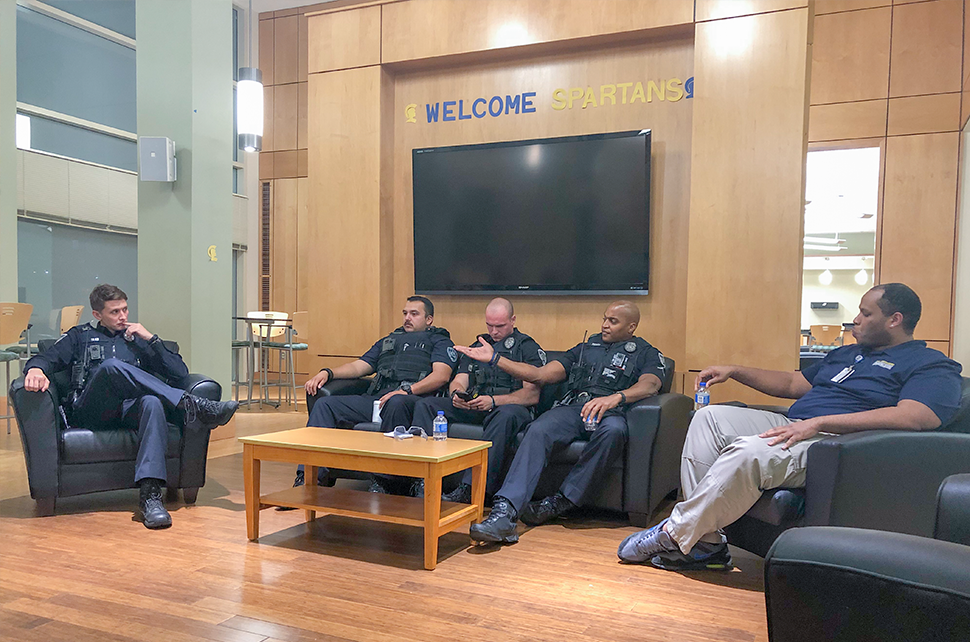
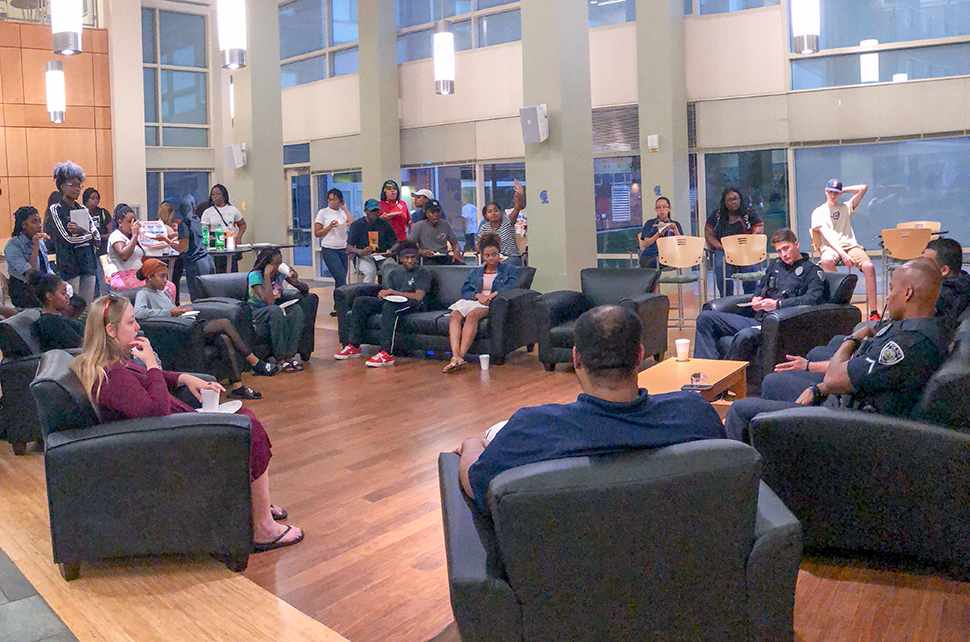
BUILDING RELATIONSHIPS: UNIVERSITY POLICE & MEN OF COLOR
Spring Garden Apartments Residence Hall
Executive Summary
The Spring Garden Apartments community facilitated a program on February 27, 2019 with university police to address reoccurring themes regarding interactions between law enforcement and young men of color. This program targeted residential students who identify as men of color and open to all residents. Topics of discussion consisted of men of color being scared to interact with the police based on societal trauma, not knowing the proper protocol during traffic stops, understanding how to build healthy relationships with police, and learning the day to day functions of law enforcement. During this program, police addressed an array of topics to unpack the answers to the listed concerns via a presentation facilitated by veteran UNCG police officers. Students engaged in an open dialogue and received answers to their questions.
Program Assessment
Pre & Post Questionnaire with 16 student responses
Key Findings
Students in attendance did in fact show a significant increase in comfortability with UNCG PD. Responses indicated that through an increase in conversations and interpersonal interactions between university police and students in the residence halls could continue to foster healthier relationships. Program attendees indicated excitement to begin interacting with campus police with significantly less fear following the program. The assessment also informed UNCG PD that prior to the program majority of students were not aware of the LiveSafe app.
BREAKING BARRIERS PROGRAM HIGHLIGHT & ASSESSMENT
“The ‘60s: From Then to Now to Breaking Barriers for the Future”
Breaking Barriers is a social justice focused, a departmental initiative which touches on all six core values of Housing and Residence Life: Diversity and Inclusion, Teamwork, Community, Personal Growth and Safety and Security and Innovation. Breaking Barriers promotes social justice through the deconstruction of the barriers that prevent the interaction and growth of people, cultures, regions, neighborhoods, and campuses. Each residence hall planned a social justice oriented program during the Month of February focused on one of the four social issues outlined by the SJDI committee. This year’s thematic and programmatic topics: immigration, race relations, economic justice, women, gender and sexuality (LGBTQIA). UNCG campus and community were invited to attend and engage in our campus-wide signature programs. A few of the programs: “Face the Wall”, Breaking Barriers: The Reality of Living Pay Check to Pay Check,” “The House I Live In,” and “Freedom Writing.”
Assessment
One survey was designed to assess the Breaking Barrier program of 7 selected residence hall programs. Participants completed the survey at the conclusion of the event attended.
Key Findings
Safety
- 87.5% of Breaking Barriers attendees felt safe in the programming space
- 6.3% of Breaking Barriers attendees felt challenged in this space at times, but still felt safe
- 6.3% of Breaking Barriers attendees felt challenged in this space at times, and felt unsafe at times as well
Information Benefit (did participants feel that the information was beneficial to them)
- 68% of Breaking Barriers attendees said that the information was very beneficial
- 25% of Breaking Barriers attendees said that the information was somewhat beneficial
- 6.3% of Breaking Barriers attendees said that the information was not at all beneficial
Knowledge/Awareness Increase (Did participants knowledge increase after the program)
- 87.5% said that their knowledge regarding social justice awareness did increase
- 12.5% said that their knowledge regarding social justice awareness did not increase
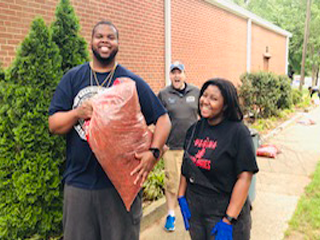
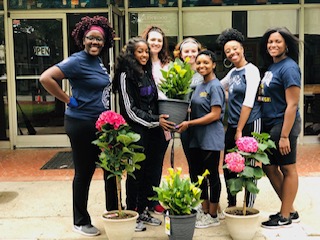
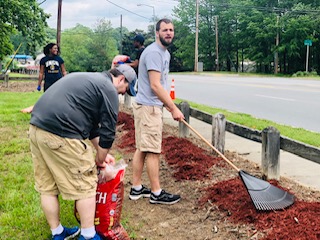
| Hall or Group | Service Site | Brief description of service project | Hrs. | # |
|---|---|---|---|---|
| Jefferson Suites | Spartan Pantry | Students helped organization to arrange and organize donated clothes | 2 | 12 |
| Jefferson Suites | Clara House | The building hosted a drive to collect feminine products | ||
| Jefferson Suites | JS,TV,SGA Area | Students beautified the area by picking up trash | 1 | 11 |
| Jefferson Suites Hall Council | Black Child Development Institute of Greensboro | Hall Council sold Candy Grams and donated the earnings to the BCDI | ||
| Jefferson Suites Impact | Glenwood Recreation Center | Volunteered for Monster Mash Program | 2 | 4 |
| Spartan Village 1 | Glenwood Recreation Center | Monster Mash | 4 | 14 |
| Spartan Village 1 | UNCG | Glenwood Open Streets | 2 | 19 |
| Spartan Village 1 | Glenwood Recreation Center | Flowers, Friends, Fun | 3 | 4 |
| Spartan Village 1 | Glenwood Recreation Center | Easter Egg Hunt | 4 | 2 |
| Spartan Village 1 | UNCG | Hall-Oween Village | 3 | 16 |
| Ragsdale Mendenhall Hall Council | UNCG | Clothing Drive for Hurricane Florence Victims | 3 | 11 |
| Ragsdale Mendenhall Hall Council | UNCG | Food Drive for SOP | 2 | 318 |
| Ragsdale Mendenhall | Moss Street Partnership School (Shelley’s Area) | Students went to help teachers organize materials for classrooms before the first day of school | 3 | 7 |
| Ragsdale Mendenhall | UNCG | Clothing drive for SOP & Salvatin Army | 3 | 7 |
| Vagina Monologues | The Clara House | Fundraising for survivors of domestic violence ($4,210.40) and feminine product collection (300) | 55 | 603 |
| Phillips-Hawkins | HRL Resource Room | PH RA staff cleaned up and re-organized the RA Resource Room in Weil/Winfield | 1 | 6 |
| Weil & Winfield | Kare For Kids | Residents will make Halloween/keep fighting cards for children with chronic illnesses. | 2 | 12 |
| Weil & Winfield | Spartan Open Pantry | RA Ray took residents that are in need in his hall to the SOP. Building wide email also sent out to spread awareness regarding the resources SOP offers. | 1.5 | 6 |
| Cone Hall | Cone Hall/UNCG Campus | Cone Hall Council worked within the hall to contribute to the Toy Drive for Seven Homes Foster Care in connection with RHA. | 5 | 7 |
| Quad | Moss Street Partnership School (Shelley’s Area) | Students went to help teachers organize materials for classrooms before the first day of school | 3 | 17 |
| Mary Foust | UNCG | Annual Ashby Haunted House: “Dr. Frankentsein’s House of Horrors” fundraiser for The Arc of Greensboro and Spartan Open Pantry | 96 | 321 |
| Mary Foust | UNCG | Annual Ashby Foustock Music Festival fundraiser for The Arc of Greensboro | 9 | 73 |
| Mary Foust | Washington DC | Alternative Spring Break | 72 | 2 |
| Guilford | UNCG | Strong College residents proposed and received a Green Fund Grant, and in collaboration with the Sustainability Office, distributed compost buckets and liners, with filters, to students who signed up (including a signed commitment to separating their waste and properly caring for their bins). Two interns from Strong and an Ashby volunteer checked each participating room once per week. Residents empty their compost into a large bin located behind Mary Foust, and the interns wheel it to Spartan Dining for disposal regularly. | 60 | 34 |
| Mary Foust and Guilford | Moss Street Partnership School (Shelley’s Area) | Students went to help teachers organize materials for classrooms before the first day of school | 3 | 6 |
FACILITY RENOVATION
The Cone residence hall renovation project began in May 2017 by taking the residence hall off-line for a year. With a tight deadline, this project was implemented and completed by August 2018. The thorough renovation of the nine-story residence hall included:
- Replacements of the heating
- Ventilation and air conditioning systems
- Electrical service
- New emergency generator
- Refurbishment of elevators
- Various ADA upgrades
- Bathroom updates
In addition, Cone would re-open with a new visual and performing arts themed community, Studio 91, as an exciting option for students interested in art, dance, music, or theater. Cone now offers a new wing of practice rooms for music and theater, a music composition computer lab, a drawing lounge, a dance practice room with a sprung floor and mirrors. These are just some of the new amenities built.


COMPLETION RATES
Housing and Residence Life strives to provide exceptional customer service, in doing so, the facility management team continues to track their progress. Since the implementation of TMA (Time Management) in summer of 2015, HRL facilities has increased the response time to work orders by 62.2% while continuing to add new and renovated facilities (Cone, Lexington & McCormick) and the number of corrective and PM work orders.
This particular report shows improvement from the entire Facilities team including the project office, IT, housekeeping, inventory management, and maintenance.
| Aug 1 to March 1 | Total Work Orders | Completion Rate |
|---|---|---|
| 2015 | 13,851 | 1.80 days |
| 2016 | 13,894 | 1.74 days |
| 2017 | 15,734 | 1.52 days |
| 2018 | 17,304 | 1.11 days |
RESIDENCE HALL MOVE-IN PROCESS
Moving 5700 students into 25 residence halls requires a great deal of preparation and learning from each prior move-in process. Prior to the Fall 2018 move-in process, Housing and Residence Life adjusted the schedule for when each hall would move in. Buildings with smaller parking or unloading areas were also evaluated to see how the number of students could be spread out over multiple days. This involved working with student organizations such as Panhellenic Council to move-in early and help decrease congestion on later move-in days.
Housing and Residence Life also used previous year’s move-in numbers to determine where to provide volunteers to help with move-in assistance. HRL is able to provide the most resources to help students move-in between 8am and 5pm and encourages residents to come during this time. Knowing this does not work for all residents or their families, buildings staffs are available 24-hours a day from the first day of move-in until the first day of classes to check residents in to the hall.
Move In Traffic
| Prior to 8/8/18 | 910 |
|---|---|
| 8/8/2018 | 1497 |
| 8/9/2018 | 1571 |
| 8/10/2018 | 1278 |
| After 8/10/18 | 444 |
| Total | 5700 |
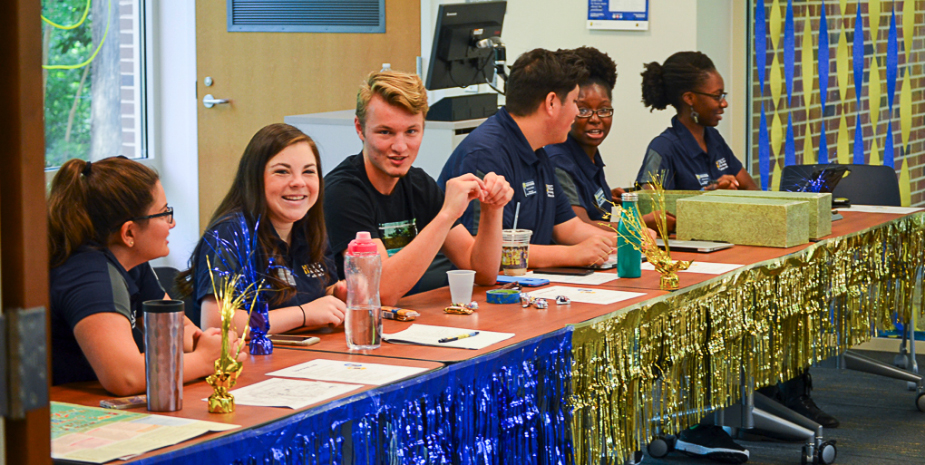
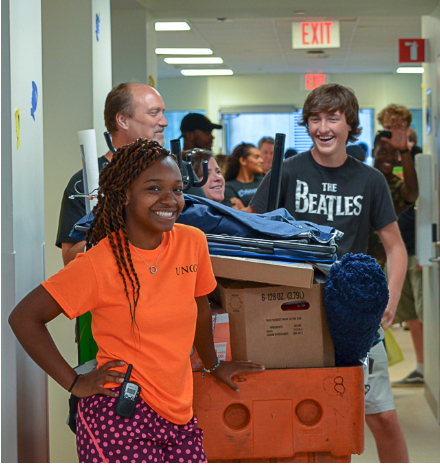
OCCUPANCY 2018-19
Total Occupancy Fall 2018
Aug. 20 | Nov. 20 | |||
|---|---|---|---|---|
| Student Type | Count | % | Count | % |
| Returners | 2723 | 48% | 2698 | 48% |
| New Transfers | 367 | 6% | 362 | 6% |
| New Upperclassmen | 230 | 4% | 226 | 4% |
| New First Time (FR & GR) | 2403 | 42% | 2367 | 42% |
| Total | 5723 |
Total Occupancy for Spring 2019
Jan. 14 | Apr. 24 | |||
|---|---|---|---|---|
| Student Type | Count | % | Count | % |
| Returners | 2511 | 46% | 2488 | 47% |
| New Transfers | 454 | 8% | 424 | 8% |
| New Upperclassmen | 157 | 3% | 144 | 3% |
| New First Time (FR & GR) | 2281 | 42% | 2245 | 42% |
| Total | 5413 | 5301 |
ROOM CHANGE
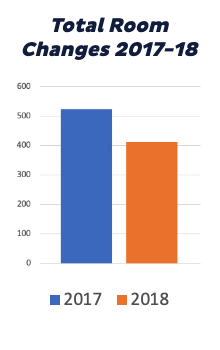
During the first two-three weeks of classes, HRL has an open room change period when students can make room changes with no reason required. After the open room change period ends, the students must work with their Coordinators for Residence Life and/or Assistant Directors for Residence Life to be approved for a room change.
In the Spring Semester, HRL allows Freshman admitted for the Fall Semester who have lived on campus, to room change into upperclassmen spaces. This results in almost one hundred more room changes completed during the Spring Semester.
We have seen a 22% decrease in room changes from 2017-18 to 2018-19. In addition, Roommate Satisfaction as assessed in the 2018 EBI/Skyfactor Assessment has shown an increase from 5.84 to 6.01, which is an almost 10% increase. As indicated in the chart below, the increase in satisfaction from 2015 has been even higher.
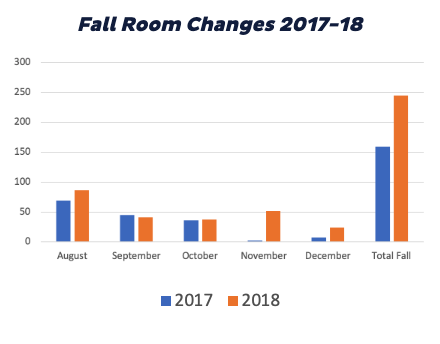
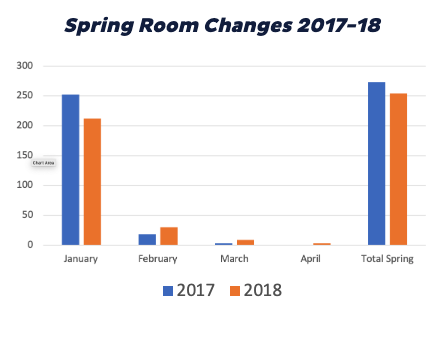
Innovation is one of the core values of Housing and Residence Life, staff are always on the lookout for ways to use technology to improve processes, create efficiency, and ultimately better serve our residents.
SPARTANTV
In July 2017, Philo was implemented and grants all on campus residents the ability to watch live television from a variety of devices anywhere on campus as long as they are connected to the campus wireless. Philo provides 96 live channels and DVR capabilities and allows streaming to phones, laptops, tablets and media streaming devices like Roku. In October 2017 we also started providing additional web services like HBO GO and Cinemax GO.
- Total Channels: 96 including HBO and Cinemax Premium Suites
- Average Active Philo Users Per Month: 1823
- Average Hours Per User Per Month: 59
Top 5 Channels
2018
- BET
- MTV2
- Cartoon Network
- ESPN
- VH1
2017
- BET
- VH1
- MTV2
- Cartoon Network
- ESPN
MEDIACONNECT & DEVICES
UNC Greensboro now provides a mechanism (mediaconnect.uncg.edu) to connect some gaming consoles and Internet TV devices to the wireless network in the residence halls.
Through a self-service registration process, each resident can have up to three entertainment devices connected to UNC Greensboro’s network at a time.
MediaConnect & Device Comparison from 2017-2018
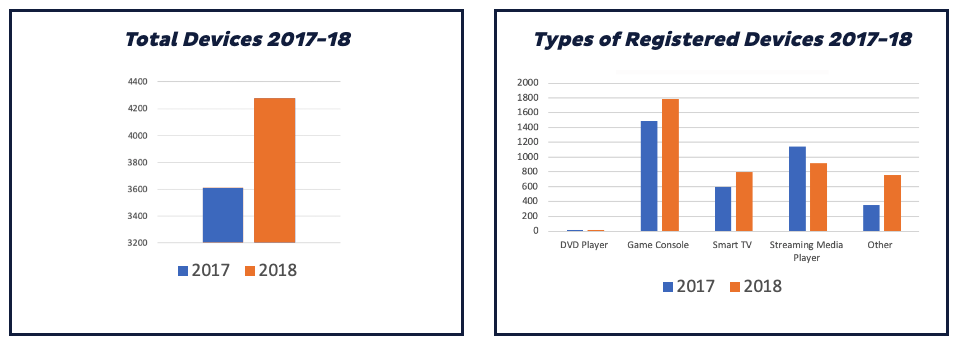
Typical Network Traffic
Typical network traffic in the Residence halls from April 7, 2019.
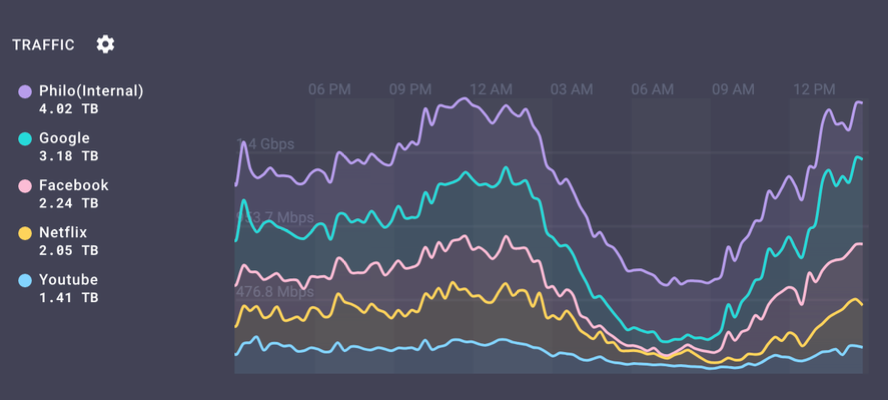
Active Philo Users
Typical number of active users on Philo on from April 8, 2019.
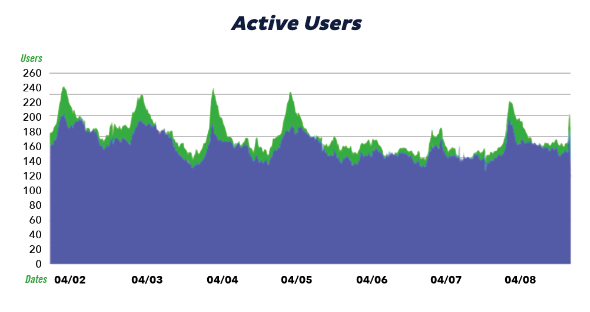
ROOMPACT
In July of 2018, Residence Life implemented a third-party digital education system called Roompact. This system is designed to act as a “hub” of information for resident advisors (RA) and professional staff members. Several processes were streamlined and are now administered by one central system. With the support of this software, these processes include roommate agreements, Connections (intentional residential student interaction tracking), duty logs, lockouts, program proposals and evaluation, and room condition reports.
Roompact Totals
- 35 individual forms used in various residence halls
- Over 3,000 Roommate Agreements Completed
- Total Programs – 1,383
- Total Connections – 25,686
- Total Forms – 44,389
- Lockouts – 4,088
Roommate Agreements
No more paper here! In the past, residents would complete a paper copy of their roommate agreement, and give a copy to their RA. If changes needed to be made, the RA would have to give the agreement back to the residents, who would make the changes, and then return the form back to the RA.
With our new system, the process is entirely online. Residents receive email reminders letting them know to complete a roommate agreement at the beginning of the year. The form is fully customizable and allows HRL staff to provide prompts for students to discuss important topics. Once the agreement is finished, each resident submits with an electronic signature, then the RA is notified. Should changes be needed, residents simply log into the system and update the agreement.
- 70% OF FIRST-YEAR STUDENTS COMPLETED A ROOMMATE AGREEMENT.
Programming
A total of 1,383 programs were offered within the residence halls, with this new system allowing the program proposal, acceptance, and assessment all to be completed in one centralized location. The submission form was updated to include current measures of interest, such as faculty involvement and academic support.
Room-Condition Reporting
Developing a start-to-finish room condition reporting process has proven difficult in the past. This year was no different. While the Roompact software allowed for customizable room condition reports to be delivered to students based on the type of housing in which they reside, photos of any damages had to be emailed separately. This caused additional work on the staff, as they needed to sort, label and digitally store the photos in a separate location. Fortunately, Roompact was receptive to the concerns shared and have added the option to submit a photo with the RCR form in the 2019-2020 academic year. This will save a great deal of time for residence life staff and provide a more streamlined process for our residents.
Digital Entries by the Numbers
RoomPact Digital System
- 35 individual forms used in various residence halls
- Over 3,000 Roommate Agreements Completed
- Total Programs: 1,383
- Total Connections: 25,686
- Total Forms: 44,389
- Lockouts: 4,088
TMA Work Orders 2017-18
- Aug. 1-Nov. 1, 2017: 505
- Aug. 1-Nov. 1, 2018: 52
WEBSITE (HRL.UNCG.EDU)
Traffic
- Sessions = The number of visits to the site
- Users = The number of visitors to the site
Goal: The goal is to show steady improvement over time.
Site traffic is a basic measurement of a site’s reach and growth and can be studied over time as a general way of determining the effectiveness of marketing efforts. It shows an overall snapshot of the website’s performance. Since 2010, hrl.uncg.edu has seen an upward trend in the number of users, as well as the number of sessions on the site as follows:
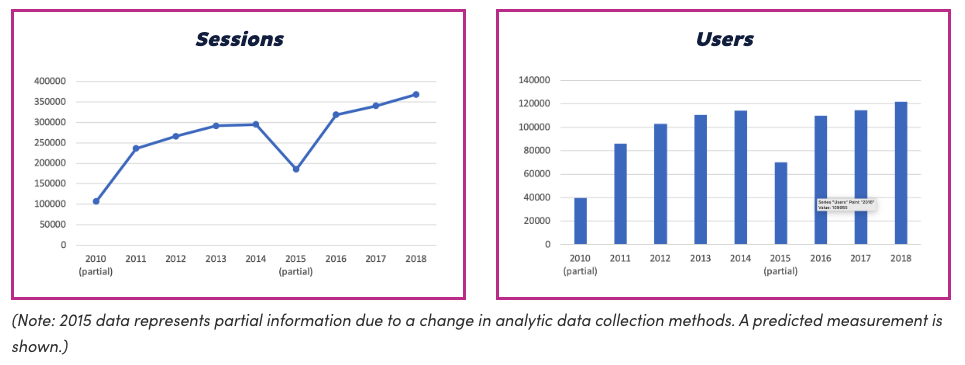
Bounce Rate
The percentage of people who leave the site without looking at any other pages
Goal: Achieve a low bounce rate.
Bounce Rate is a general sign of user engagement and the quality of the content on the site. It is useful to identify when there are problems with the site, but should be considered alongside average session duration and pages per session (below). A high bounce rate means that users aren’t staying to check out other areas of the site. In a general sense, the goal is to keep the bounce rate low. Following are the bounce rates for hrl.uncg.edu. These rates have seen an almost steady decline since 2010, indicating that users are engaged and are checking out multiple areas of the site each time they visit.
Pages Per Session
How many web pages users view upon each visit to the site
Goal: The unofficial industry standard is 2 pages per session.
The goal is to keep users engaged in the site and to get them to explore next steps or further information. In a nutshell, pages per session indicates interest in UNCG’s housing and residence life information. Since 2011, the number of pages per session have more than doubled industry standards.
*Variability in this area may be a function of site redesign. Content was redesigned to maximize efficiency in finding content. In other words, users don’t have to search through as many pages to find the information they seek.
Average Session Duration
Average Session Duration = the average amount of time users stay on the site
Goal: For a good average session duration, the industry standard is 2 – 3 minutes.
Longer session durations indicate more engaged visits. Basically, how much time users are willing to give to the content. The website remains solidly within the industry standard with regard to the amount of time users stay on the site.
*Variability in this area may be a function of site redesign. Content was redesigned to maximize efficiency in finding sought content. In other words, it may take users much less time to find the information they seek.
Important Notes:
*Redesign and Site Consolidation Dates:
| Date | # Web Pages | Notes |
|---|---|---|
| Jun. 2010 | 502 | Very limited content, poor functionality |
| Jan. 2011 | 3,400 | All content gathered, generated, and presented |
| Dec. 2014 | 219 | Switched to WordPress, content consolidated/functionality improved with plug-ins |
| Sept. 2016 | 140 | New Responsive design. Further consolidation for mobile devices |
| 2017-18 | 177 | Page totals remain fairly consistent and unaltered |
| Mar. 2019 | 236 | Restructured all photos into sliders; Consolidated all residence halls pages; Added digital assessment book and SJDI Newsletters |
Summary of Findings
Since 2010, goals for the HRL website have been met consistently.
- Site traffic shows steady improvement over time.
- There has been an upward trend in the number of users, as well as the number of sessions on the site.
- Bounce rates have seen an almost steady decline, indicating that users are checking out multiple areas of the site each time they visit.
- The number of pages per session have consistently doubled industry standards.
- The website remains solidly within the industry standard with regard to the amount of time users stay on the site.
Impressions
Twitter impressions refer to the actual interaction or engagement generated once a tweet has been posted to various Twitter streams – the interaction or replies from others online. This chart compares the HRL Twitter impressions from 2016 to 2018. Twitter was used more aggressively to promote information beginning January 2017, based on the decreased interest in Facebook.
Engagement Rates
Engagements are the total number of times a user interacted with an HRL Tweet. (Clicks anywhere on the Tweet, including Retweets, replies, follows, likes, links, cards, hash tags, embedded media, user name, profile photo, or Tweet expansion.) Engagement rates represent the number of engagements divided by the number of Twitter impressions.
URL Clicks
URL clicks refer to the number of times users click on a URL (web address) in a Tweet that links to our HRL website content. This chart shows URL clicks from 2016 – 2018.
In 2018, Housing and Residence Life hosted 20 camps or conferences and nine SOAR (new student orientation) sessions which average 300 students and families to visit our residence halls between May 12 – July 22. Serving new groups as well as returning ones, HRL hosted more than 6700 guests, an increase of 8.7% from 2017 and generated nearly $515,000 in revenue for the department. In addition, in 2016, HRL started offering housing to non-UNCG students participating in internships in the Greensboro community. In 2018, 20 students from as far away as Michigan and Canada lived in Lee residence hall during the summer. Each year since, the number of interns requesting housing has grown.
Below is a chart comparing the data for Summer 2017 and Summer 2018:
| Name of Group: | Number of participants in 2017: | Number of Participants in 2018: | % Increase or decrease |
|---|---|---|---|
| All Arts-Sciences, Technology Camp | 223 | 202 | -10.40% |
| Appalachian State Upward Bound | 39 | 41 | 4.88% |
| Carolina Soccer Camps | 434 | 411 | -5.60% |
| Computational Number Theory | 18 | 14 | -28.57% |
| DCCC Upward Bound | * | 18 | N/A |
| EdD in Kinesiology Orientation | 22 | 22 | 0.00% |
| Interns – non UNCG students | 14 | 20 | 30.00% |
| Math-bio REU | 8 | 9 | 11.11% |
| McNair Research | * | 9 | N/A |
| Music Camp 1 | 1,082 | 1,086 | 0.37% |
| Music Camp 2 | 1,047 | 1,079 | 2.97% |
| NC Sports Medicine | 59 | 58 | -1.72% |
| Sharks Swim Club | * | 31 | N/A |
| SOAR 9 sessions & staff | 2,956 | 3,349 | 11.73% |
| Spartan StartUp | * | 46 | |
| Summer Arts and Designs Intensive | 52 | 75 | 30.67% |
| Summer Dance Technique | 9 | 7 | -28.57% |
| SUS Sport Exchange | 21 | 23 | 8.70% |
| UNCG Chance | 79 | 142 | 44.37% |
| UPCEE Upward Bound | 69 | 54 | -27.78% |
| Volleyball | 16 | 38 | 57.89% |
| *Group not here in 2017 | 6148 | 6734 | 8.70% |
2017-18 Assessment Practices & Highlights
It has been an historic year at UNC Greensboro, celebrating 125 years of educational excellence and service, growing and striving to improve with each new generation of students. The on-campus residential experience has played a significant role in creating this legacy of excellence and Housing and Residence Life is excited to continue to build that legacy for generations of Spartans to come.
A significant part of building our legacy is assessing our successes as well as where we could improve our community to better serve our students. HRL endeavors to create an environment where assessment happens every day, in every aspect of our program. Our staff work to make informed, data-driven decisions, based on intentional assessment of our programs, services, and operations. Through these efforts, HRL strives to continually improve the residential experience.
This booklet provides a brief snapshot of assessment practices within Housing and Residence Life. Whether it’s welcoming new students in partnership with faculty and staff through the “House Calls” program, assessing and building our connections with our neighbors and the City of Greensboro, or simply evaluating the cleanliness of our facilities or the efficiency of our maintenance operations, HRL is committed to learning and improving through assessment.
While we could not begin to capture all that HRL has accomplished over the past year in this brief series of highlights, we hope that the information provided here will offer a glimpse into the experience we strive to provide to our residents, and the impact we hope to make on our campus and beyond. Though assessment is a department-wide process, a special thanks to Maggie Gillespie, Coordinator for Special Projects, and Kory Burgess, Assistant Director for Marketing, for their leadership in this process.
Please enjoy.
Timothy Johnson, J. D.
Executive Director
Office of Housing & Residence Life
The University of North Carolina Greensboro
2016-17 Assessment Practices & Highlights
Housing and Residence Life seeks to create a culture of assessment where staff members are making informed, data-driven, decisions. By routinely reviewing our programs and services through intentional assessment, HRL is able to continually improve the residential experience. All members of the HRL team are encouraged to engage in assessment practices and support is provided throughout this process.
This booklet provides a brief snapshot and overview of assessment practices within Housing and Residence Life. Whether it’s through our bi-annual participation in the national benchmarking program provided through SkyFactor in partnership with Association of College and University Housing OfficersInternational (ACUHO-I), assessing student learning within the residence halls, or simply gauging resident satisfaction, HRL is committed to learning and improving through assessment.
While we are unable to highlight all the great work being done throughout the department, we hope the information contained within will provide a glimpse into the experience we seek to provide for our residents, and the impact we strive to make on our campus and beyond. Though assessment is a department-wide process, a special thanks to Chris Gregory, Assistant Director for Residence Life, and Maggie Gillespie, Coordinator for Residence Life, for their leadership in this process and the creation of this booklet.
Please enjoy.
Timothy Johnson, J. D.
Executive Director
Office of Housing & Residence Life
The University of North Carolina Greensboro